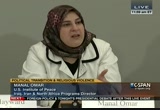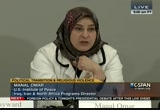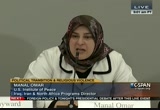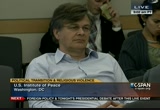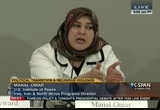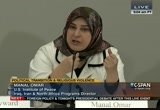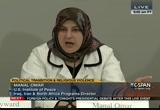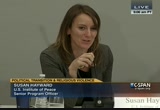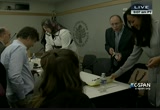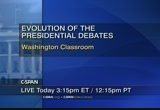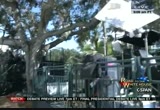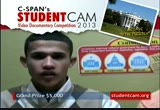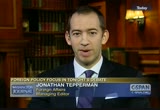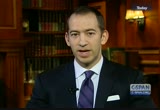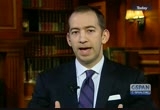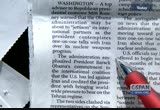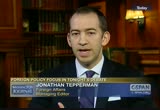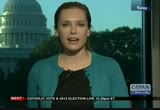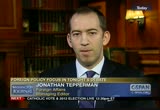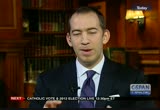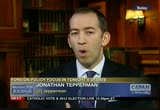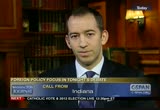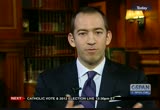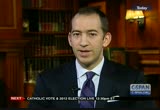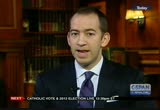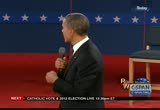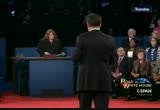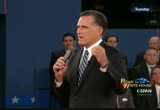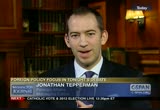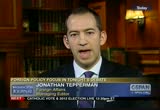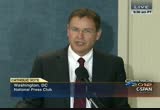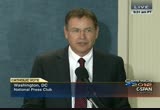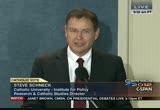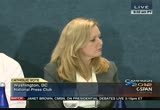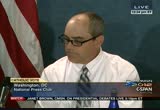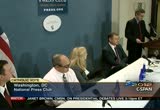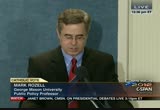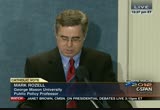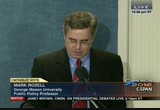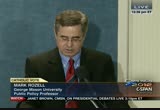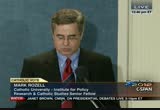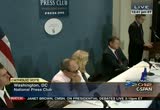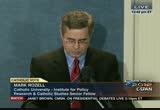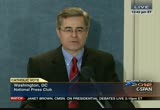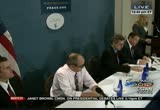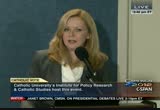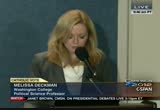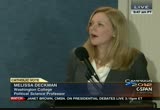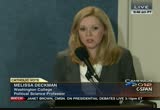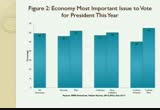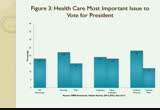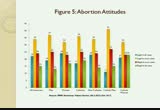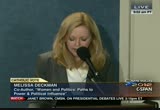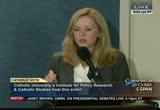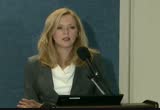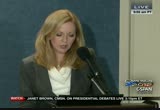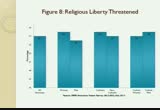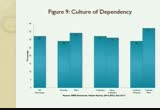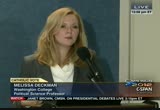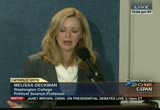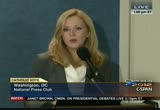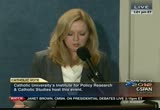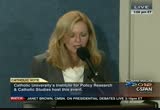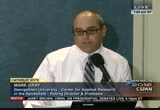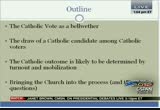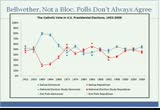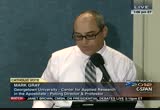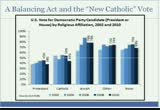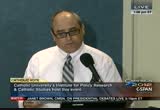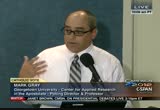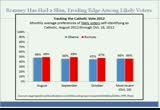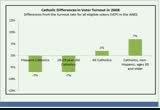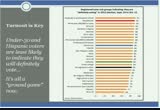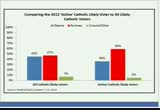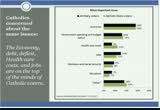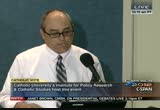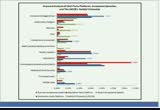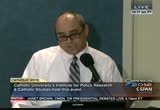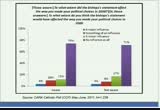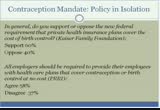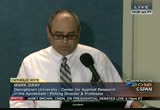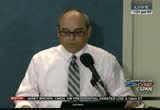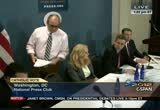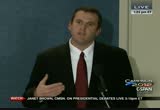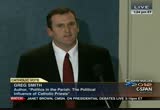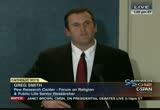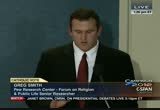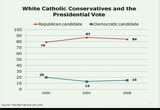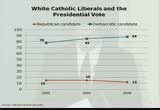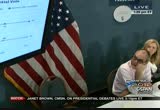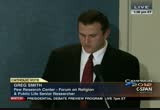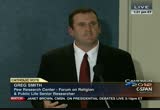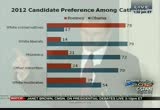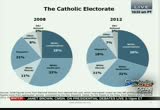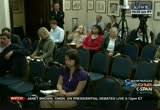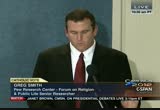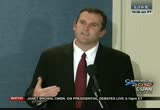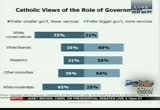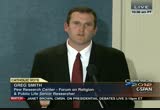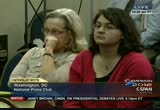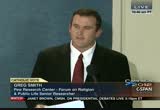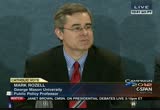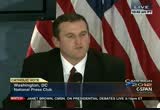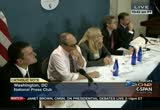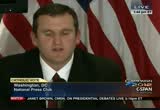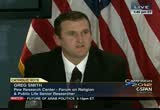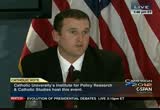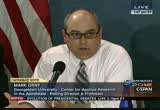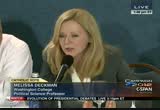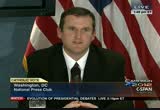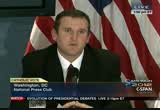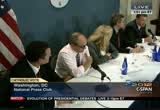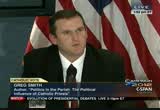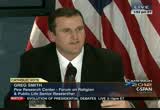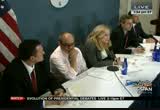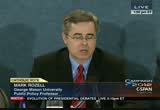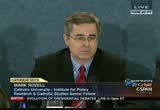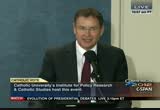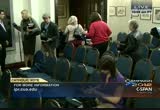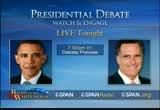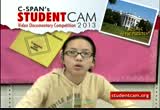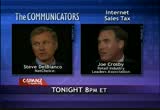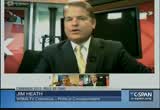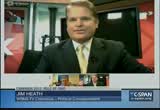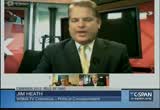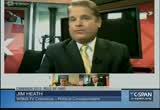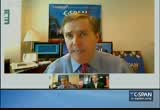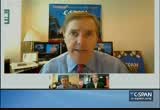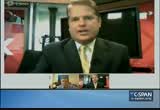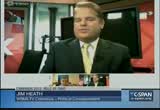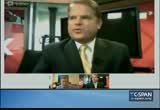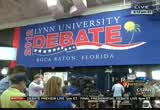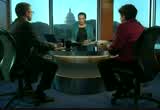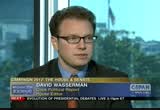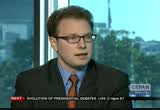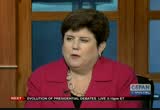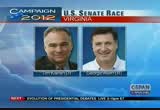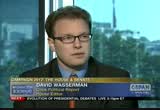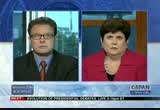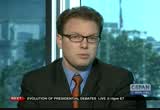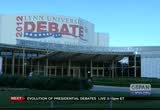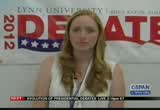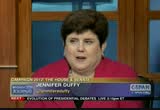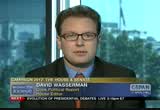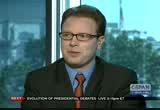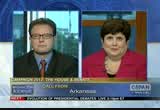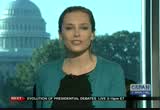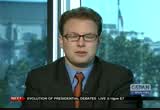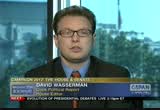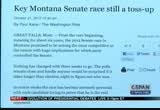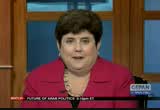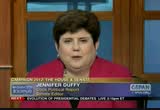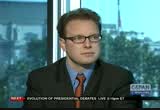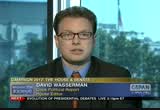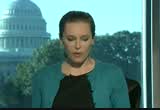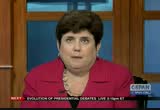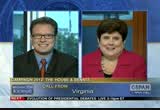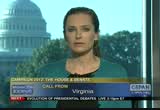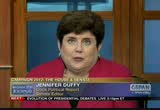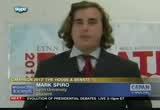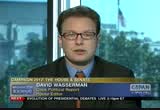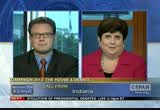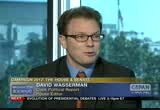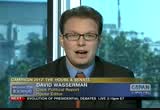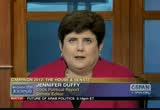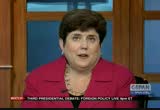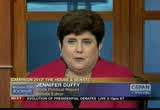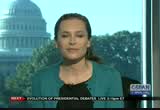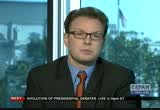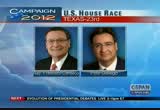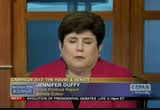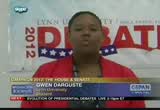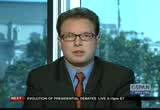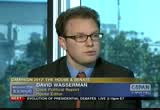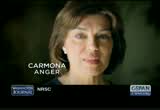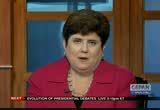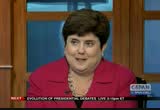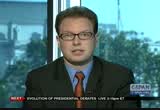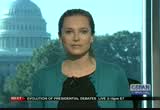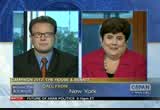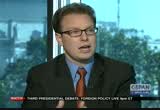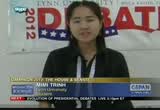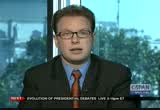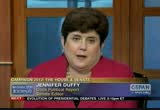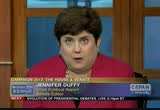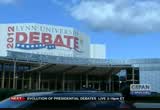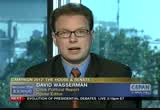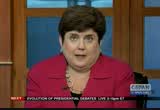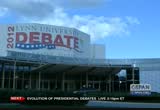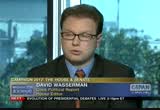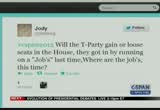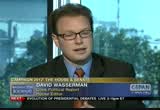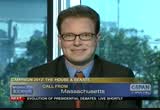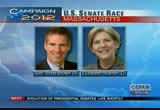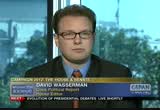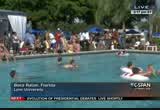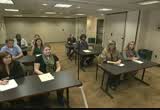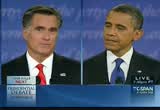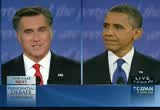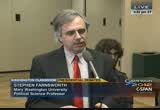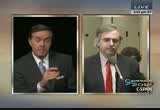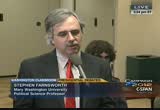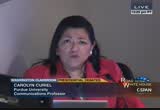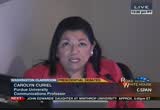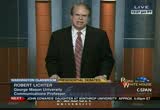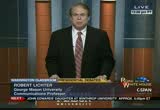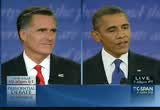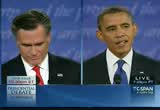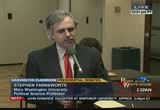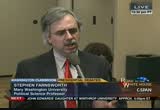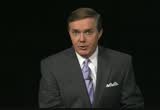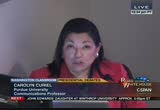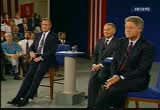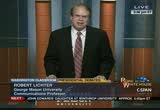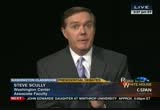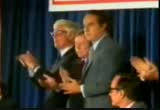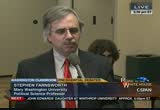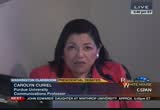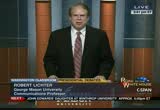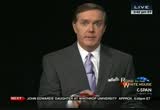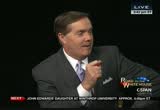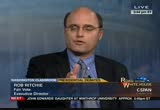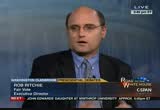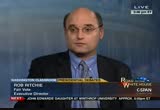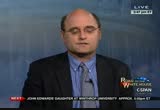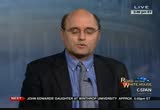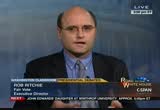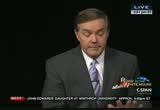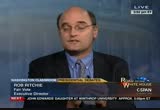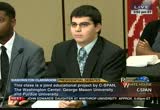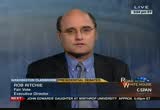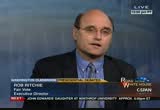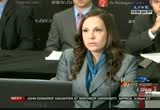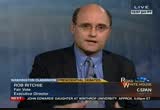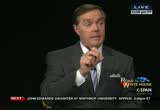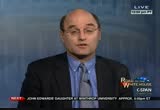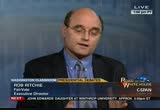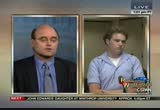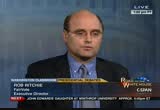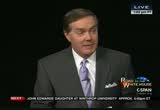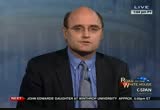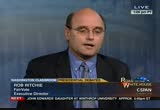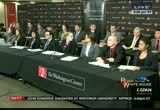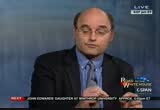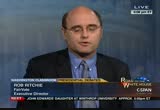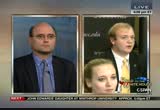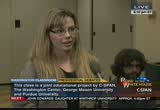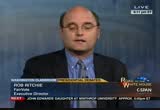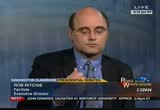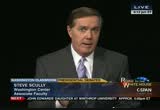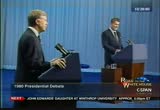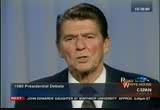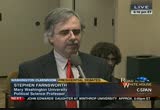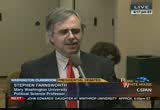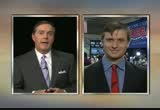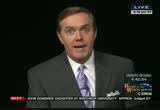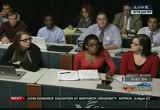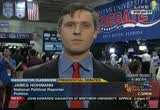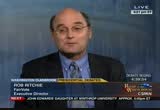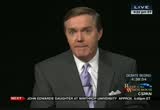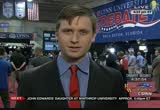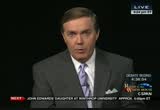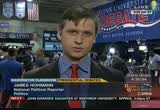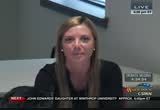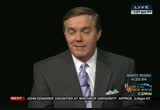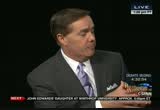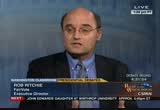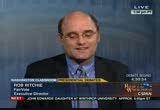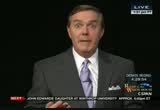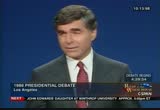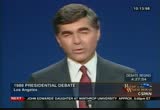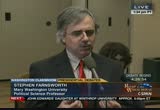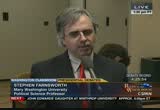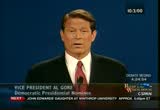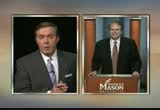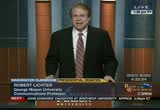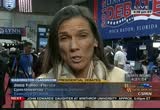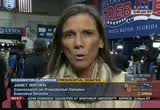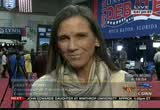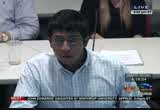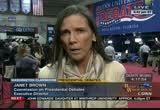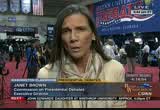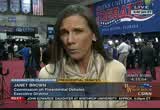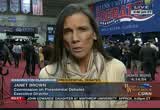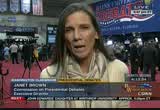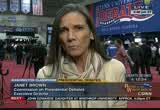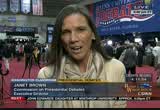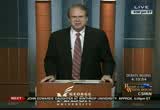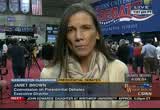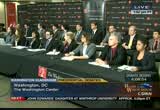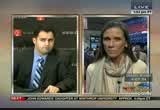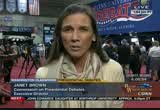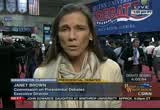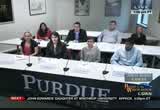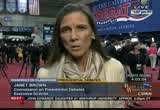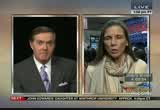tv Public Affairs CSPAN October 22, 2012 12:00pm-5:00pm EDT
12:00 pm
when it comes to minorities, we have to be uncompromising on the principles but also flexible and open to the approaches and the timeline. most importantly is the timeline. if we are managing expectations in countries. the international community wants these governments to do, so that we are not actually setting them up for a failure. on the twitter question in terms of a secular language, a lot of people in the middle east talk about the secular fundamentalism. that is what people are of ticket. when it translates to note religion, understanding or creating a new word or taking back the word "secular" is what needs to happen. there needs to be a broader conversation where they can be inclusive, and the point about
12:01 pm
the rule of law, dealing with religious law, those debates can take place, but there is a need to understand a new term or terminology needs to be negotiated and used so you are not just restricted to religion. there is a danger because your putting religion in, and it is hard to argue the word of god. how do you equate that put the words secular and secular or fundamentalism are what are being rejected. that question about the declaration of human rights is a good question, and it goes to the idea about not just -- few people will pull apart universal declaration of human rights where there are reservations on the restrictions of religion. underlying is the mistrust. it goes to back about understanding the new social
12:02 pm
contract and the relationship. people understand there is a misunderstanding. human rights and democracy is called on when there are certain political wo;; and is ignored in other assets. we do not acknowledge it. we do not acknowledge it in strong terms, but is not owned. that is a larger question, how can we address this perception or reality of double standards when we want to call on human rights and when we want to try the other way and not acknowledge it. the question of different values, that was the point i was trying to bring when i said we needed to look at extremism from within. not for just our domestic issues, but overseas, people want to see that debate.
12:03 pm
how can we take it to a larger audience? i agree with my colleagues about the start -- david, this is in relation to your question about the values. there are essential differences. for me, with the eternal islamabad dynamic, i struggled during conversations because there are things i will not be able to accept. it is important we have this conversation, but my fear has been we have conversations where no one can hold a gun, and we did not get to the difficult conversations. we have to build the trust to get to the typical confiscations. one of the ways i do it and focus on, the rules of engagement for disagreement. the understanding is we are going to have disagreements. the weight use the women's rights, and we both have islamic
12:04 pm
arguments. here is what islam says about disagreements. using an islamic framework for the this agreement allows people to understand we will talk about disagreements, not just common ground. we will do it respectfully. the dow you is you see it. but to isolate people, you see people shipped and begin to understand the other perspectives. that is powerful because people believe in -- and assume you are out to get me. this is an age-old conflict. when they aren't able to see the prospective, understand the argument and also see the fear -- with islamic issues on women's rights, a lot of the secular women are not just being difficult or eight religion. they are afraid of the rights that they feel will be taken away from that.
12:05 pm
mothers instill fear in their daughters. they say we do not want to be in saudia are arabia or iran. the women who are practicing will say we did not to be in turkey. there is a fear, a legitimate fear, saying we do not want to experience what we have seen happen when religion is brought in or when secular fundamentalism is brought in. that breaks down when they do not agree to each other, but that understand each other's perspective. most arab countries, race is not a crime. this is horrendous, and for me, how can this be justified? when one woman was able to justify it, no one agreed with her, but for the first time people were not like you are so crazy, you are ignorant, and you
12:06 pm
are a pilot woman. they understood her issues to the point where they could build an argument that could counter it. she understood you're talking trauma on top of trauma, and they were able to draft a new language for the criminal law. that can only happen by going beyond arguing, and rather than going crazy when she defends the law, understanding perspective, then you are able to come out with conclusions. it is a difficult process. i cannot tell you how many times i have been uncomfortable. i am talking about in the trust discussions, i am extremely uncomfortable, but forced myself to listen to understand other perspectives and others -- and large a lot. >> we are over time, but i hope -- want to thank you for coming
12:07 pm
and participating in this discussion, and i want to thank the ambassador and the office of international religious freedom for co-sponsoring us and encouraging us to hold this panel. i want to thank all my presenters for giving such nuanced and fruitful comments on the topic. thank you very much. [applause] [captions copyright national cable satellite corp. 2012] [captioning performed by national captioning institute]
12:08 pm
>> if you missed coverage of this panel, go to our website at c-span.org. we have more live events coming up. we will take you to catholic university in 20 minutes for a program looking at the impact of catholic voters in the and coming -- upcoming election. later, a discussion looking at tonight's debate, this from our washington classroom program.
12:09 pm
12:10 pm
our video journalists are on campus, and we will continue showing the scene throughout the day. a reminder that our preview program will get underway at 7:00 p.m. eastern. the debate will start at 9:00, and we will get your reaction afterward. we also have a question -- we would like to know what question you would like to ask the candidates. the focus on the presidential debates, c-span is asking middle-and height-school students to send a message to the president. in a short video students will answer the question, what is the most important question the
12:11 pm
president should consider in 2013? there is $50,000 in total price is available. it is open to students grades 6 through 12. with tonight's debate, discussion now on some of the key issues likely to be discussed, from this morning's "washington journal." host: drawing us now is jonathan tappaepperman. a lot of the talk about is that a lot more rides on this debate than a few months ago.
12:12 pm
guest: foreign policy tends not to be featured in campaigns. normally this debate would be a sideshow. the opposite will be the case, because we are two weeks away, and we are suddenly tied in the polls, and performances in the debate have been so important. you can expect both canada to swing for the fences tonight. host: are we going to hear substantive differences between their philosophies will they be in policy decisions? > guest: romney has been so much
12:13 pm
of a cipher. he has limited himself to saying, the criticizing the obama, and that criticism as not to the civic, that obama should be tougher. when he gets down to talking about what he would do differently, so far to differ does have been minimal. you can look at syria where romney has said he would be tougher. what would he do differently? maybe getting a few more high- powered arms to the rebels, but that is about a everything obama has done already, the challenge for romney will be to move beyond mere criticism -- tonight will be to move beyond mere criticism of the president and come up with a positive agenda and specific agenda of what he would do differently. the challenge for obama would be something different.
12:14 pm
obama came into office four dramatic terms about how his foreign policy was going to be different from his predecessor. he was going to change the overall tone. he was going to reset relationships with russia. what has happened instead is that he has become a moderate, pragmatic realist. he has managed things very responsibly, but not in a dramatic way. this is the parallel problem he has talking about his agenda. so far he has been saying that he can offer more of the same, but that is not a very sexy campaign line. it will be interesting to see if he can go beyond that. host: here's a story from "the tribune" newspapers this morning. "mitt romney warned that the obama administration may be about to jettison its international partners as it one-on-one talks are about to engage with iran over the nuclear plant."
12:15 pm
-- program." new york times" story that came out over the weekend about possible talks with iran. how much will this influence tonight? guest: i suspect that it will feature prominently. this is a new dynamic. on the surface, the signals that iran is sending is a win for the administration, showing that these incredibly comprehensive sanctions that the obama administration has managed to cobble together, more successfully than any other previous white house, has forced iran to the table was starting to hit them where it hurts. that is a win for the administration.
12:16 pm
on the other hand, iran has a long history of manipulating these for their own purposes. that is the line that you can expect mitt romney to take against obama. the question will resolve to, what will mitt romney do differently? it is ironic that he is now starting -- that his prophecies are starting to criticize the obama for doing things excessively unilaterally, for doing things without allies, when the mitt romney criticism throughout the campaign is that obama tends to rely too much and doing things without allies and if mitt romney were president, he would take a strong stance and go it alone on a whole range of international issues. host: jonathan tepperman is the manager of "international affairs." here are the numbers to call --
12:17 pm
host: let's take a look at the list that bob schieffer put out about what will be talked about and what the segments of tonight's debate are. afghanistan, pakistan, redline israel and iran, the change in italy's and terrorism, and then the ride to china and tomorrows world. jonathan tepperman, what do you read out of those topics alone? guest: it is a heavy focus on the middle east. people have criticized the it excludes other important parts of the world, especially asia, which has become a big focus of the it ministration policy. it also has the potential to get obama away from his substantial list of accomplishments on foreign policy throughout his career.
12:18 pm
if you go through what those have been, they go through the decimation of al qaeda, the killing of osama bin laden. sanctions on iran, falling out of iraq, the partial reset of relationship with russia, the pivot toward asia and this new focus on the asia pacific region. now, some of those are in there, but some of them are not and you can expect obama to shoehorn them in. obama has done pretty well on substance and obama has a big edge coming into this campaign in knowledge as well as substance. remember, mitt romney was like a one-man neutron bomb, laying waste to the audiences he spoke to, leaving only the furniture standing.
12:19 pm
that puts him in a difficult position tonight. i expect him to try to shoehorn in other issues, like defense spending, where he has accused the president of cutting too dramatically. i think that there will be attempts by both parties, actually, to smuggle in extra topics. host: matthew, democratic line, like wood, washington. caller: my question would actually be about syria. when willie gets bad enough where we have to take action? the syrian border, there has been shelling in turkey, spilling into lebanon. that is a fairly immediate threat to the middle east and also to israel.
12:20 pm
guest: that is a great question and i hope that the candidates will address it tonight, but my fear is that they will not, for the simple reason that i think neither of them knows what to do in syria. i just came back from two weeks in the middle east and what was very evident is that not only do these countries along the border syria not have a policy, but the united states does not have a policy, which is why you see virtual non-action. this is one of those areas where mitt romney's policies that do not differ from obama's. the ministration is looking into the funneling of light arms to the rebels, while the romney administration said he would look harder than obama at heavier weapons being funneled by allies'. but those are minor differences.
12:21 pm
how either of them see the end game playing out, where either of them have the trigger for u.s. involvement, i do not expect them to commit tonight, i do not think they have the answer. host: michael, independent line. caller: president barack obama has failed, first in his recent reset with russia, an ally with china, who is in cahoots with iran. terrorists want to destroy america because we are strong. my other point is -- foreign policy on the illegal immigrants coming into america. american people who have their
12:22 pm
own issues in america, and also the poor. i hope that mitt romney has good answers for these issues, because barack has failed. supporting the killing in libya -- what is his name? muammar gaddafi. and then not supporting the diplomats in the country. guest: russia is a good issue to talk about, because it highlights one of those well- kept secrets on foreign policy and the presidency. once someone takes the big chair behind the desk in the white house, they find they have a very few options on the tough problems facing u.s. foreign policy, which is why there has not been that much variation between democrat and republican presidents.
12:23 pm
that is because the options are so constrained. russia is a perfect example of that. mitt romney early in the campaign called russia an enemy of the united states and he was roundly criticized, not just by democrats, but by republicans. romney called russia an enemy of roundly criticized. the united states can't afford to label russia an enemy. it is too powerful. there are still a number of areas where russia's corporation is key. a has been helpful to the u.s. agenda. russia has been difficult when it comes to iran and a few other areas. how do you get more from them? struggling with.
12:24 pm
this should be an area where romney offers an explanation for what he would do differently. in terms of immigration, this falls into the category of the subjects were both candidates -- i do not know the differences will be profound. but you see is that romney is trying to reposition himself as a moderate. what we're seeing is a return to the massachusetts mitt romney and it has much more moderate positions issues such as immigration.
12:25 pm
he favors giving green cards to foreign students who study in the united states. rather than compulsory measures, he favors voluntary deportation. if you can find someone to explain that to me, i would be all ears. host: we have a tweet from matthew. he uses the hashtag we have set up, #cspan2012. let's take a look at the issue of libya. it came up last week. this is one of their exchanges. [video clip] >> the day after the attack, i
12:26 pm
told the american people that we will find out what happened, that this was an act of terror, and that we will hunt down those who committed this crime. a few days later, i was there meeting the caskets and grieving with the families. the suggestion that anybody on my team would play politics or mislead when we have lost four of our own is offensive. that is not what we do. that's not what i do as president or commander in chief. >> if you want to respond.
12:27 pm
>> the president said that this was an act of terror. you said the day after the attack it was terror. it was not a spontaneous demonstration. >> please proceed. >> it took the president 14 days before the president called it an act of terror. >> get the transcript. >> he did call it and act of terror. >> can you say that alittle louder? >> the administration indicated that this was a reaction to a video and was a spontaneous reaction. it took them along time to say it was a terrorist act by a terrorist group.
12:28 pm
am i correct in that regard? the ambassador spoke about -- >> i am happy to have a longer conversation about foreign policy. i just want to make sure we get the questions answered. host: that was an exchange last week at hofstra university, talking about libya. one writer said as it was a missed opportunity for governor romney to gain some ground. guest: romney tried to blame gotcha with the president and chose the wrong word.
12:29 pm
there are two issues with libya. we're more likely to see discussion of the latter than the former. why was there not better security for this u.s. mission in benghazi? especially since they requested it from the state department. with the campaigns have focused on thus far is the communications issue, how the obama administration dealt with the question publicly after the attacks. the romney campaign has a point here. the next day, susan rice seemed to give a not very nuanced statement.
12:30 pm
she was acting on the advice of the intelligence committee. >> we will leave this now to go to the national press club. the catholic institute for policy research and catholic studies is hosting a discussion. >> to present the latest poll numbers and the latest trend lines related to that. this is a continuation of something we have been working on. the institute for policy research and catholic studies at catholic university of america is a public policy think tank. we look at contemporary issues of public policy from the catholicve of the church's social teachings. the institute has 40 fellows who
12:31 pm
are part of the institute. we have been around for a while and are a good resource for people who are interested in the intersection of religion, the catholic faith, and contemporary politics. i want to say as a part of the university, the institute is an academic institute. we do not advocate for a particular public policy, nor for any individual candidates. in that spirit i should say anything that is said to day at this panel does not reflect the considered opinion of the institute, nor does it represent the university. we are speaking as academic experts today. the format for the discussion is straight forward.
12:32 pm
we have a panel here. will beginrcerizekk with introductions. each of the speakers will speak for 15 minutes. following the panel presentation, there will be a question and answer period. what i would ask is that you come up to the microphone that is here so you can be captured on camera and identify yourself and post your questions at that time. after the event is over, everybody will be available other questions and so forth privately. thank you very much for attending today, and i we are absolutely fascinated, and given the current state of a dead
12:33 pm
heat national election, about whether the catholic vote. let me introduce dr. mark rozell, a senior fellow for the institute for policy studies. >>good afternoon. my task is to introduce the panel and the groundwork for what each of them is going to be discussing in their presentations. then i will also give a leadoff presentation on the catholic vote, or the myth of the catholic vote. the order presentation after my own will be first melissa pacman, professor of political science at washington college and a nationally recognized issue -- professor on women in politics. she is the author of a book,
12:34 pm
among many other works. her presentation will examine the gender gap in the catholic vote as low as attitude about reproductive rights, the hhs mandate, and religious freedom, using data taken from last month's public religion research institute's american values service. then dr. mark gray, the director of polling of georgetown university. he is also an associate professor at georgetown. his research focuses on culture and politics, political participation, a religion and politics. he specializes in survey research, trend analysis, and cross sectional time-series studies. then finally, dr. craig smith is
12:35 pm
a senior researcher at the pew research center's forum on religion and public life. his research surveys are among the most respected in the nation. he will examine the swing voters of catholics that is closely divided and capable of voting either way in any given election. i failed to mention mark gray's presentation will talk the underlying complexity of the bellwether defects at treated to the catholic vote as low as the boards of turnout and mobilization in how the catholic vote is likely to result.
12:36 pm
that is the agenda for today. each speaker has 15 minutes, i promise we will each keep to our time limits, myself included. the conventional wisdom in politics is certain swing voters, particularly catholics, will likely decide the presidential election outcome. observers create a misleading portrait when they refer to the phenomenon "the catholic vote," as though it is a mobilizing force. 35 million catholics voted in 2008, or about 27% of the electorate over all. in the modern era, catholics usually comprise about 1/4 of the electorate. most substantial concentrations of catholic voters are in the
12:37 pm
midwest, northeast, mid-atlantic region, and some what the west coast. in is in many of the usually competitive states in the electoral college, such as pennsylvania, michigan, ohio, wisconsin, that catholics have the most significant numbers. the catholic electorate is a diverse and varied. white catholics vote differently than latino catholics who are the fastest-growing population among catholics. recent elections give a good education -- indication of how much the catholic vote is up for grabs. in 2008, barack obama won a 54% of the catholic vote, and that approximated a percentage of his overall national vote total. in 2004, president bush won
12:38 pm
similar sized majorities in both the national boats and the catholic vote. in 2000, al gore won a slim majority of the popular vote nationally end of the catholic vote as well. in 1996, clinton won a comfortable national majority and even a better turnout among catholics. it is hard to imagine the catholic vote as a monolithic force given these varied results in the modern era. the catholic vote today is deeply divided between the major political parties. it is important to understand that diversity of that group and the challenges that any candidate faces when making special appeal to catholics. just as background, the catholic vote once was nearly monolithic. catholics were once a key constituency of the old new deal coalition that anchored the
12:39 pm
democratic party. many catholics were from immigrant families who lived in the inner cities, and they are identified with labor union sentiments. economic status and ethnicity, largely explained catholic support for the democrats for many decades. the splintering of the catholic vote began in the 1970's, when george mcgovern in 1972 appeal to abortion rights advocates and then the supreme court issued roe v. wade decision. but the 1980's, the republicans' appeal to perot-like voters and more catholics began to shift their allegiance is. from 1980 until 2000, only one democratic presidential candidate secured a majority of the catholic vote, and that was bill clinton in his 1996 landslide. religious beliefs are not the
12:40 pm
dominant influence on the voting behavior of most catholics. there is no single political based organization that mobilizes catholics as a voting bloc. the church hierarchy is sometimes reluctant to offer six years with regard to voting preferences. when bishops offer such signals, many catholic voters simply ignore those appeals. the loosening of the democratic party identity and voting among catholics largely occurred due to economic trends and population shifts. although their parents or grandparents were the immigrant underclass and loyal democrats, many catholics today have achieved economic success, moved to suburbs, and become independents republicans. one scholar stated that the catholic community has experienced the same homogenization of other
12:41 pm
immigrant groups in the united states. as he put it, catholics went to the melting pot and came very much looking like other americans. in brief catholics today are more educated, wealthy, suburban, employed in the higher professions, than ever before. many catholic professionals are business owners who care baabout taxes, where their parents and grandparents and aunts were more concerned about wages and welfare. the shift away from the once democratic party dominance of the catholic vote has not meant a full embrace of the republican party by catholics.
12:42 pm
democrats have experienced substantial loss among catholics, but republicans have experienced relatively modest gains. like the rest of the electorate, catholics have become increasingly independent of the political parties. the trend among partisans is increased -- republican listen, among white catholics and 60%, and increased support among democrats with the fast-growing latino population, which is about 1/3 of all catholics. in 2008, a majority of white catholics voted for john mccain, but 2/3 of latino catholics voted for barack obama. republicans have strong support among those catholics who attend religious services often. democrats have strong support among the so-called nominal or
12:43 pm
cultural catholics. in 2008, john mccain won 51% of weekly church attending catholics, and obama's catholic majority was anchored by his strong support from occasional and non-church attending catholics. for the 2012 election, it is likely that the divide between the observant and a nominal catholics will grow, as president obama's policies on contraception, u.s. aid for international family planning organizations, and other social issues have driven a deep which within the catholic community. mitt romney appeals to white church-going catholics because of his social conservative views. is it religious identity for them and it appears simply not to matter. a new survey being released tomorrow by public religion research institute suggests that a key to the outcome of this
12:44 pm
election will be which of these catholics actually shows up. i note some of the others on the panel will discuss these and other data in more detail, so i will now turn to melissa deckman from washington college. >> good afternoon. i am here today to talk about the gender gap in american presidential collections and how catholics play into this longstanding trend. women voters matter more than ever in presidential elections because first, there are more women who are registered to vote than men, and secondly, women are more likely to vote than men. since war reagan's selection in 1980, women voters have been more likely to vote for democratic candidates than men. this gender gap was alive and well in the 2008 election when
12:45 pm
obama outperformed by women voters by seven percentage parts. 60% of women voted for obama. obama held a 13-point advantage among women voters, of whom just 43% voted for don mccain. this summer it looked as though, would likely -- was likely to maintain a double-digits advantage among women, but polls in recent weeks demonstrate that the race for women voters is tightening. what can we expect in 2012? election year in which both presidential campaigns are desperately trying to appeal to women voters? , are we likely to see a continuation of the gender gap, and does a gap exists among catholic voters? today i will look at where men and women stand in terms of their likely vote, using data just released from the public religion research institute. i will examine two issues as
12:46 pm
they relate to the women's vote, report that the rights and social welfare policies. these issues are prominent in this year plus presidential race on and are two issues of vital concern to the catholic church. both issues and body of the commitment to the less fortunate or the least of the street for the catholic bishops, the least of these also include the unborn, which drives their fears with use trick is worth noting that women have been more likely to vote democratic not because of reproductive rights issues, but because of their attitudes about the social safety net. when men have been more supportive of government providing benefits tothan men . given that the republicans have been influenced by the tea party, has called for limiting the size of government, including calling for deep social welfare cuts, with a
12:47 pm
budget opposed by the catholic leaders, it will be interesting to see if this shakes the intentions of voters including catholics. let's look at what the public religion research institute data has to say about where voters stand. figure one i put on the percentage of americans who indicate that they are likely to vote for obama. i should mention a thank you to robbie jones and nan cox for lending me the data. this data was collected at the end of september before the presidential debates have occurred. might be dated because some lamented in quest some momentum is going toward romney. the margin of error is only about two percentage points.
12:48 pm
pri asked in this study, if you were to -- if the election were held today, for whom would you vote? patrice% -- a 53% said obama. there is a discrepancy since september. in terms of gender, if you look at the next bar graph, we see there is a slight advantage among women voters for obama, and we see a large divide moving on between catholics and non- catholics. this divide is being driven by hispanic latino voters. i do not have the updated -- that data, but the pri data cyndi 2% of -- 72% of latino
12:49 pm
catholics indicated they would vote for obama. in terms of looking at catholic women and men, we see the gender gap extends to this group. 58% of catholic women they would be likely to support obama. the american dow use survey also asked to indicate which issue was most important to their vote, and by far the economy was listed as the most important. 59% of all americans said the economy was most important. the most important issue for both men and women, although men are somewhat more likely to say that the economy was the most single important issue compared with 56% of women. with catholics, there is little
12:50 pm
difference. both catholics and non catholics say the economy is the most important, but this is an interesting figure. catholic man, 65% say the economy is the most important, compared to 50% of women. there is a deeper gender gap when it comes to the role of the economy. when it comes to health care, this is the second reason given for the choice in the upcoming election. 18% of americans said health care was the single issue prompting them to vote one way or another. there is a gender gap, and this is not surprising. when care more than the social safety net and have been more supportive of the affordable care act. 22% of women say health care is the most import issue, compared to 15% of men. among catholics, there is no difference.
12:51 pm
if he/gender. catholic women, almost twice as likely to say health care is more important than catholic men. i want to show you today that with respect to abortion. but there are not abortion is the most important issue in terms of casting your vote, pri asked that, and we see for few americans this is the case. only 4% of americans say abortion is the issue that is most important event in this election. men and women, catholics and non-catholics, you see similar data. one interesting point is catholic women are more than twice as likely to say that abortion is more important their vote than men and. this is a small part of the population, but i will touch on that with respect to catholic men and women here in a few minutes. reproductive rights -- hard to
12:52 pm
remember a presidential election in which women's reproductive health issues have played a larger role than in 2012, and that has been driven by two factors. one is the health care mandate, which has been fiercely opposed by the u.s. conference of catholic bishops which believes the ban takes is a violation of religious freedom. they sponsored a fortnight for freedom last summer, to oppose this mandate. the other thing that is driving the role of reproductive health as a campaign issue is this an adamant pro-like position taken by the republican party. this is highlighted by the gop's adoption of a per-life platform during their convention come up in which the call for a complete ban for abortion except with cases of the life of the mother.
12:53 pm
the misery senate candidate taught a can -- todd akin's remarks, and he and paul ryan had close much a billion -- a bill in congress. republicans and house also voted to stop federal funding for planned parenthood. as result of this mandate and the pro-life pivot by many republicans, the democrats have countered by talking more about their per-choice credentials. in their convention, their pro- life position was talked about at length by the democratic party. abortion still remains less salient than issues of the
12:54 pm
economy, and i thought it would be interesting to look at recent data on abortion attitudes by gender and by catholic status. this slide shows abortion attitudes nationally. there is a lot going on here, but essentially the first two lines of every bar graph are the percentage of americans who think abortion should be legal in all cases or illegal in most cases. the last two bars, the percentage of americans who think it should be illegal in most or all cases. what it boils them to is 56% of all americans say it's illegal in all or most cases. -- say in it should be legal in all or most cases. abortion attitudes have been stable since the case was decided in 1973. if you turn to the gender gap in
12:55 pm
catholics, there is no significant difference in those few points when looking at the views of men and women. going all the way to the end, catholic women, they are the most likely to say among all these groups that abortion should be illegal in all cases. you see a big difference compared to say catholic men. only 15% of them would say it should be illegal. this might help explain on the previous figure police saw catholic women were twice as likely to say abortion was a more important issue in the election than men. turning to support for the health and human services mandate for hospitals and universities, a majority of americans according to the american values survey support the obama administration in this initiative. 56 set% of americans say they agree with this policy. women are more likely to agree
12:56 pm
with it than men. this is no difference among catholics when you put them together, but it is surprising is that we find catholic men are more supportive of this mandate and our catholic women here. 54% of women compared to 52% of catholic man. both support this mandate. pri also asked about support for the health and human services mandate for churches, which supports requiring churches, other houses of worship, to have interest policies that cover birth control. here to support false a little bit. only 40% of americans agreed with this. interestingly, men were more likely to have support for this position than women, and you see some differences among the gender here than in the population. the bishops have made this issue
12:57 pm
about the mandate into a matter of broader attacks on religious freedom, and not just the catholic bissett spirit there are a lot of conservative evangelicals who have also made the point. given the majority of americans say they agreed with the mandate, we find that a majority of americans also believe that religious liberty is threatened, that somehow the data are quite a bit here. a majority of both men and women, catholics, non- catholics, field that religious liberty is threatened. that message seems to have resonated with quite a few americans. the last light of what to talk about is this idea of culture of dependency, getting back to the social welfare issue. most studies of the gender gap show attitudes drive -- and
12:58 pm
there have been vocal critics of the ryan budget which would cut spending on social services. republicans have been influenced by the tea party movement in the past three years, and the tea party espouses that government should be less responsible for providing these services. when government provide social welfare, it creates a culture of dependency. i was struck that paul bryan used those words the vice- presidential debate. the survey asked americans whether they were more likely to agree that government policies, aimed at helping the poor, if they created a culture of dependency where people are provided to any handouts. the percentage of americans who were more likely to state that those policies creek a conflict -- a culture of dependency. it is few. only 32% say that is true. there is a gender gap here as well.
12:59 pm
survey data have shown that women are more progress on issues about social welfare, and we find 29% of women agreed that welfare creates a culture of the ponzi compared to a 34% of men. there's not a lot of difference when you look at catholics together, but among men and women we see a civilian gender gap. catholic men are more likely to agree with that statement that are women. to sum up, day death from public religion research institute shows a gender gap among voters that is similar to recent presidential elections. obama is pulling more support from women. the gap is driven less by issues such as reproductive rights, abortion -- abortion remains a more salient issue -- it is driven by more safety net issues. romney campaign recently has
1:00 pm
been able to close the gap despite this data showing women are less likely to believe that programs for the poor create a culture of dependency. women like men are more likely to say the economy matters, so it appears that the romney campaign's emphasis on how the economy affects women >> when it comes to catholics, there are several points to emphasize. it is largely a function of obama's overwhelming popularity of latino men and women. i do not include this on the table, but there is a gender gap among latinos. generally speaking, the vast majority of latino men are still
1:01 pm
supporting obama. what is driving them is immigration. the economy is the most important for them, but immigration is the close second. roughly one of four said that immigration is their major reason for going to the polls. he can see how that is benefiting barack obama in this election. catholics are more likely to back from the overall, but there is still a gender gap. he does best from white catholic man, but obama still holds a lead among white catholic women, at least in september. with respect to the views on abortion, the health and human services birth control mandate, religious freedom, and the culture of dependency, it appears that the vocal opposition is not stopping most catholics from supporting it, at least when it comes to catholic hospitals or universities. there is more opposition among
1:02 pm
catholics more generally. only a slight majority of catholic men and women, if applied to churches, the catholic men are more likely to support the mandates. i am going to close with this point. i think the data here printed a interesting point on catholic women. the women are more likely to agree with the church hierarchy on social justice is and social issues, such as abortion. this is probably because american women, in general, including catholics, are more religious than men and more faithful when it comes to church attendance. sity may ber religiou why we see fewer catholic women supporting the help and services mandates. we also see that fewer catholic women believe that it creates a
1:03 pm
social dependency. however, at the end of the day, catholic women like a catholic man and like americans who generally believe that the economy is still the most important in this election. thank you. >> will now give his presentation. >> ok. thank you for the invitation to speak here today. we are an independent, non- partisans social research center established in 1964. we focus on research for and about the catholic church. we have been tracking catholic polling data since the primaries began.
1:04 pm
we try to attract as many sources as possible. it has not done any pulling itself during this election season. i am relying heavily on other pollsters here, including pew, which is always kind enough to share with us what happens are doing in terms of the election. i picked out four different topics that i think are interesting or important from our analysis throughout the election. these four are that first, looking at the catholic vote as a fair weather boat, it is true, as mark noted, often the winner of the catholic vote is the winner in the popular vote. about 25% of the voters are expected to be catholic in november. the drop of catholic canted its
1:05 pm
rigidcandid -- the drop of catholic candidates, does this matter? does one draw catholics more than the other? the third thing would be, how important is turnout going to be here? we hope to show you that it has really turned out among different subgroups. will be important in determining how the catholic vote ago as. and finally, how the and -- what role the church has been and how that will affect a catholic of votes. -- how it will affect the catholic vote. reporters typically focus on exit polls only, when trying to determine who won the catholic vote. this is always risky. exit polls have other issues.
1:06 pm
this year it will be even more risky. we will have to wait for other polls to come out. there will not have as many interviews and will have higher margins of error. you could see that it has really only been a block in a two alexians in recent memory. since then, it has fluctuated back and forth. though polls have not agreed. as is also elected two massachusetts candidates. in 1998 were the polls to not agree who won the catholic vote, and the other in 2004. if you aggregate all three of these polls, it looks like perhaps john kerry did when the catholic vote. the fact that it is no longer a block and i think it is more
1:07 pm
accurately referred to as a bellwether the vote is a bit of a fluke. i do not think this is in any way to determine a stick -- i do not expect this to always be true. the way in which the latino catholics are more likely to support the democratic party, and as that grows, i suspect that perhaps it will not be as good a predictor in future elections as it has been in the past as a bellwether. one of the things we have focused on in this election season is how the catholic vote is important and how it can be seen as a bellwether or swing vote. these are from exit polls for recent elections. you concede this is a percentage supporting the democratic party candidate.
1:08 pm
you can see on the right there, those of the people with no religious affiliation. and then those with another religious affiliation which is neither catholic or jewish have supported the democrats in the last decade. i would not expect them to have any chance of this election among protestants. however, the catholic one is the one that is swinging back and forth. it is going above and below 50% here. it is and of a goldilocks of votes. beholding these two balanced with two different outcomes. we started tracking of voting preferences with the republican primaries. of course, there's no sense in
1:09 pm
doing this on the democratic side. this is a unique election in the sense that the republicans were running to catholic candidates and for a time or ahead in the polls. however, if you aggregate -- not every contest had exit polls. among catholic voters, romney won the catholic vote. there were 10 states where there is actually polling done. in eight of those, romney won. gingrich and santorum each won one of the primaries. what this is, we already saw the data on kerry. being a catholic no longer matters for the catholic a voter. it's magic for jfk, but it has not mattered since. there are two candidates who are catholic. i think democratic catholics are
1:10 pm
very comfortable voting for joe biden and republicans are comfortable voting for paul ryan. tracking multiple sources, including ps service, looking among registered voters of laid- back to one year ago, if you average over the whole trend, 48% to 45%, currently it is at 55% versus -- among registered voters. you can see here, brief periods of time when romney basically won the nomination, he jumped ahead and during the republican convention, he jumped ahead. otherwise, the president has had a pretty solid and consistent lead among registered voters. however, it is among likely-of voters for the president has the biggest problem. we have a few were polls here. we have nine since august.
1:11 pm
romney is lead in a seven of these and tied in a two. he is tied in the most recent which basically mary's the most recent national polls. romney might have a slight edge here. because undecideds may break his way, giving a trend over time, that romney may be leading or the president continues to lead among registered catholic voters. it is really about turnout of a specific groups. the president's biggest problem is with catholics turning out among -- one, off hispanic catholics, and two, young catholics. there was a high turnout election for both of these groups. they turned out well below the average with the overall turnout
1:12 pm
was. piquancy catholics overall had hired turn out to than the overall electorate. if you look at catholics who are non-hispanics, it is the fact that the potential catholic voters that support romney are so much more likely to vote then the catholic potential of voters who support the president, then you can have this distinction between the president leading among voters or not trailing among likely voters. this can make a real difference in an election when catholics make up one in four voters and that is the same in the swing states. when c.a.r.a. ran the numbers, we found that they make up the same. this is not just catholics, this is everyone overall from gallup. the percentage of registered voters who are saying they definitely will vote, you can
1:13 pm
see the lowest likely turn out, only 66% of registered voters and they are definitely voting. compare that to republicans here or republican leaning groups here, those making $90,000 more of a household income. those are all high turn out to groups, versus of those without a religious association. i know that i have to show this slide. the most common thing you see out there is people who say the catholic vote is -- well, what about the real catholics? for many, they think a real catholic is a catholic who attends mass every week. of course, that is not the church is definition or a social science definition. but there is a much smaller
1:14 pm
group. electrolyte, it is a less powerful group when it comes to the vote. of course, you can see here among all catholic likely voters, romney has a slight edge, 47% of-a 45%. when you look active catholics, you can see what has been brought up here. there's a 23 percentage point advantage. what are the most important issues? this is the most recent data i could find with politico. it is consistent with what was presented, the a economy being the number 1. other issues. we also get a lot of questions about, what is drawing catholics out to vote? what are the important issues. there really is almost no difference between catholics and your average voter on what they consider to be most important.
1:15 pm
this is one of the more challenging things for catholics to consider. partisanship, and our analysis, tends to drop religion. in terms of what is most important, they tend to be divided between both parties. so, the republican party would be more consistent on life issues, marriage, school vouchers, faith-based partnership. were the democrats are more consistent on immigration, support for prop. programs, opposition to the death penalty, even climate change. the catholic church is not 90 degrees from right or left, it has issues that are important to it in both parties. this was your and we could have more than two parties, if that was allowed -- it is allowed, that does not happen -- if you would see something like a christian democratic party which would be more consistent. that choice is not here for
1:16 pm
american voters. i'm sorry but the very small type here. the church puts up for work its statement on the issue each year. what was released this year were the same views in 2008 with the new of forward. we did an analysis of the romney acceptance speech, the obama acceptance speech, and faithful citizenship. we look for the use of words. how frequently topics were coming up. the church is different than both parties. it focuses on religion more than either party which you would expect, as a surprise. abortion is obviously used more in either the parties. this one might be the most surprising. out of both parties, the church here appears to be the one that talks about the poll more than this party. it does talk about contraception more than either of the parties.
1:17 pm
what you see here, republics, although abortion is an important part of their platform, they do not talk about it as much. certainly not as much as they have in previous election seasons. the same goes for the democrats. you do not see it spoken about or in campaign speeches. for both of these parties, they do an enormous amount of polling. from all the testing, i am betting there is one phrase that came up more than any other -- a middle-class. middle class, middle class, middle class. somehow, there will get it into the policy debates. the poor are being left out unless you are reading with the church is saying are an important issue, and i think many catholics are. now, how many catholics use or even know about -- citizenship? c.a.r.a. did a survey in 2011.
1:18 pm
we ask them what it -- what it is. 30% said no. 60% said they had heard about a faithful citizenship. now, i do not want to downplay that 60% there. that is about 8 million people. social networks matter, so those are probably about 8 million influential people. we asked to what extent did the bishops' statement of fact i you make your political choices in 2008. of those who were unaware, you could see that with the they were aware or were not, you get a very similar break down. about seven in a 10 or more said there would be no influence at all. about 25% in both groups said they would have some influence, including some who would say it
1:19 pm
would be a major influence on their decision. it is almost trickle down campaign advice. you're hoping it gets to the most influential people and they pass it on. that is why it might represent a bigger percentage of those having heard a full citizenship. during the contraceptive mandate, i am not saying that this is certainly going to be a concession on how to work your questions. but, it is instructive that it did have an affect on how catholics responded to them. looking here at what was collected by a researcher. the first is two examples. she has several, but these are two examples. these are fed york, before the accommodation was made.
1:20 pm
before it had dropped into both sides. when you had catholic of voices on the far left and an m.s. in b.c. contributor who wrote an article on this issue, criticize -- an msnbc contributor who rode out on this issue. 60% of catholics supported, 40% of catholics opposed it. all employers should be required to provide their employees with health care plans to cover contraception with no cost. 58% to 37%. two consistent questions with consistent results. the next slide -- i am not saying the next slide includes things of how i think should be worded, but it is constructed to see how things change when you put church into the question. you think religiously
1:21 pm
affiliated hospitals should be required to provide their employees with health care plans, there you see the catholic vote of flip. your religiously affiliated institutions, 45%, yes. 52%, no. the second question which gets a little bit of difficult here. the requirement to provide contraceptions for women violates some of the churches religious organizations. should the government still require them to provide coverage? 35%, yes. at 65%, no. once you introduce church into these questions, it appears that it fled spirit it is enough of an influence to foot support on this particular issue. that is his policy with no context, catholics supported.
1:22 pm
we thought it was really interesting to show that there is something here in sort of influence. there are many catholics who probably use contraception. however, are opposed to this policy based on the issue of i do not want the government telling my church that it has to do something. i think that is what we are seeing in the numbers. add to the same time, i do not think this issue will determine the outcome of the catholic vote in this election. as you saw, when you ask people the most important issue, this is not it. it is interesting for social scientists to look at this, but it will not decide the election. it goes back to my second point. it will be turned out and who has the best round game. who will be able to mobilize. there are some interesting stories out there about the party's. i think in the end that will determine the outcome of this election of the catholic vote.
1:23 pm
>> greg smith from the pew forum will make his presentation. >> well, could afternoon. it is a real pleasure to be here. i am grateful for the opportunity to come and share some of our research. before i dig into some of the highlights of a recent analysis that we have conducted of what is commonly called the catholic a swing vote, let me just say a word or two about the pew forum on religion and public life. as you know, we are a product of the pew research center which is a non-partisan, non-profit organization.
1:24 pm
we have a strict non-advocacy stance which means we to not take positions on political issues. we also do not take positions on religious issues. we do not take -- we do not support candidates for parties. instead, our goal is to try to provide an objective, accurate, up to date information on important issues at the intersection of religion and public life. and certainly, understanding the features and the contours of the catholic population of the catholic vote, it is a key facet of understanding religion and public life in the united states. there are any number of ways the catholic vote might be analyzed. we had a chance to see some of those today. what i would like to do is extend some of the highlights of a report recently published. as i mentioned, takes up the question on whether or not catholics constitute a swing vote.
1:25 pm
by swing vote, i mean closely divided and capable of swinging from one party to another from election to election. i know there are other ways to use this term, but that is how i would use it today. we often hear catholics referred to as a crucial swing votes. in some sense, there is good reason for this. in recent elections, catholics have constituted a very large group. they account for about one- quarter of the electorate in recent years. they have also been closely divided in recent elections, as you can see here. and have generally tended to side with the winning candidate, although, as you pointed out, it is tough to say that they always do that. that can be an overstatement. in general, they are a good bellwether. as we heard today, catholics are also a very diverse group. the are multiple catholic
1:26 pm
constituencies. what we have tried to do in our new analysis is take up the question the extent to which the catholics constituted swing vote. it is not quite right to think of catholics as a whole or a swing constituency. i think it is not quite right to think of them that way. is there a sub group of catholics that could be seen as a swing voter group? our analysis shows, as mentioned, that most cap -- most catholics are not slowing of voters. most are either clearly and consistently republican or clearly and consistently democratic. it is really only a minority of catholics, although a substantial minority, it is only a minority of catholics that is evenly divided and prone to swinging back and forth from election to election. so, what we did to try to get a handle on this was analyze catholic voters by race and by political ideology.
1:27 pm
keep in mind, that our goal here was not relate to explain why catholics voted the way they do. instead, it was to try and assess the size and the characteristics of the sub group of catholic voters that exhibit the characteristics of a swing constituency. we divided catholics by race and ideology into five groups. white catholics who describe themselves as political conservatives. white catholics who describe themselves as political moderates. white catholics -- white catholic liberals. hispanic catholics. and other minority catholics. most of these groups are firmly planted within one partisan coalition or the other. take white catholic conservatives, for instance. this group is strongly and consistently republican. in 2000 they supported bush over the core by 59 points. in 2004, white catholic
1:28 pm
conservatives to vote for bush over john kerry, a fellow catholic, but a whopping 74 point margin. again, in 2008, this group strongly backed a republican, john mccain over barack obama by almost 70 points. clearly, this is not a swing group. it is not at all closely divided. it absolutely does not swing between the two parties from election to election. from the other end of the political spectrum, we have white catholic liberal spirit also not a swing vote. in 2000, white catholic liberals voted for gore over bush by more than five to one. we saw the same kind of margin in 2004 and in 2008, fiscal year skype liberals voted for obama over john mccain by over 7001. obviously, here again, this is not a swing vote. it is not prone to swing from
1:29 pm
one party to the other. hispanic catholics tend to resemble white catholic liberals in their voting patterns. they are not quite as one-sided, but we do see a similar pattern. in 2000, about 2/3 voted for the court over bush. an identical number supported kerry over bush in 2004. in 2000, 3/4 voted for obama compared to 1/4 that supported john mccain. we see the same pattern among non-hispanic catholics. roughly seven out of 10 have voted for the democratic candidate while 25% or less have a voted for the republican. clearly, white catholic conservatives are not swing voters. they are staunch republican voters. and white catholic liberals are not swing voters. no are hispanics or other
1:30 pm
minority. they are staunch democratic voters. the process of elimination, that leaves us with white catholics who describe themselves as political moderates. they are the only group of catholics that have been divided in the recent elections. in 2000, about half of moderates voted for bush and the other half voted for gore. in 2004, we see the same kind of thing. white -- half of white catholic moderates voted for george bush, the other half of voting for john kerry. in 2008, this group swung strongly in the democratic convention, casting 58% of their votes to obama and 41% to mccain. that is a very big swing. in 2004, this group supported republican over the democrat by five percentage points. in 2008, they favor the democrats over the republican by 17 points.
1:31 pm
that is a swing of 22 points in the course of one election to the next. that is a much larger swing that we see among any of the other catholic suckers. this is your key group of catholic swing voters -- white catholic moderates are the most closely divided and the most prone to swing from one party to the other in any given election. now, we have continued to see these same patterns in polling that has been conducted over the course of 2012 by my colleagues at the pew research center for the people and the press. these figures, and the rest will show on this chart, they are not our most recent data on catholics. brother, they come -- rather, they come from aggregate's service that has been done over 2012. the reason for that is that aggregating data in that way is
1:32 pm
the only way to generate a case count that is large enough to look at the smaller groups. these findings to not necessarily reflect the latest developments in the campaign, most obviously the debates. they are illustrious for thinking about the nature of the catholic swing vote. the white catholics conservatives have been strongly in mitt romney's corner, by more than a four to one margin this year. white catholic liberals, hispanics, and other minority catholics have essentially been the mirror image of white conservatives. these groups have been firmly in obama's camp. white catholic moderates, by comparison, have been much more evenly divided. to be sure, the balance of opinion among white catholic moderates this year has leaned towards obama as opposed to
1:33 pm
romney, but clearly they are much more closely divided than any of the other catholic voter sup groups. so, most subgroups of catholic voters are not really swing votes. it is religious white catholic moderates that can be bought as a swing vote. this raises the question of how large, how politically influential are these groups? these charts are report on the size of these suburbs and the 2008 election based on exit polls of voters. and then today, in 2012, from polling that we conducted among registered voters. you can see that in 2008, white moderates were the single largest group of catholic voters. but, there were a minority. about 1/3 were white moderates and receive the same thing reflected in the polling this year.
1:34 pm
then we have white catholic conservatives. they accounted for about 25% in 2008 and about three in 10 of the catholic voters that we interviewed so far this year. hispanic catholics account for about 1/5 of the catholic vote while white liberals and non- hispanic minority catholics each account for about 10% of the catholic vote. to put all this together, it suggests that about 1/3 of catholic voters are in a pretty strongly republican subgroup. the white catholic conservative group. another 1/3 or so far in firmly democratic subgroups -- white catholic liberals, hispanics, and other minority catholics. and then you have about 1/3 of the catholic vote that consists of this swing the vote, white catholic moderates. to get a better sense of what is going on here, what is
1:35 pm
motivating these of voters, we also took a look at some of the position of these groups. it probably will not come as much of a surprise that white catholic conservatives are conservative when it comes to a variety of issues, including same-sex marriage. about 2/3 oppose allowing gays and lesbians to marry legally. white catholic liberals, by contrast are you guessed it, pretty liberal on this and other issues. 3/4 of white capet liberals favor of allowing gays and lesbians to marry legally. there's also more support than opposition among latino catholics. unfortunately, we do not have enough interviews with minority catholics to be able to analyze their views on this issue. white catholic moderates, this is interesting, i think, look
1:36 pm
much more like white tappet liberals and conservatives on this issue. 2/3 of white catholic moderates favor same-sex marriage. we see a similar pattern when it comes to use of abortion. most white catholic conservatives say that abortion should be against the law in most or all cases. most white catholic liberals take the opposite point of view, saying that abortion should be legal in most or all set to rations. minority catholics are more /comparison. here, again, white catholic moderates look a lot more like liberals and conservatives. he conceded that 6 in 10 white catholic moderates said abortion should be legal in most or all cases. on social issues, white capet moderates tend to have liberal positions.
1:37 pm
what about views on the proper size and scope of government? here, again, white catholic conservatives experts a pretty conservative point of view. about 75% said they prefer a smaller government that provides fewer services to a bigger government that provides more services. this is a group that is consistently conservative on both social issues and on this important question of the proper role of government. whitecap the liberals are, as you might have expected, more liberal on this question, as are hispanics and other minority catholics. 60% white catholic liberals say they prefer a bigger government that provides more services over a smaller government that does less. what about white catholic moderates? here, unlike what we saw when it comes to abortion and a same-sex marriage, white caput moderates
1:38 pm
side with white catholic conservatives. more than 60% said they prefer a smaller government that provides fewer services than a bigger government that provides more services. so, this group is pretty liberal on social issues like abortion and same-sex marriage, but more conservative in their outlook about use of government. so, what you might be seeing here are cross pressures at work. this group is conservative in some ways, liberal in others. that might help to explain why they have been closely divided and prone to a swigging from one party to another in recent elections. finally, let me leave you with what the data suggests about the religious attendance of these groups. we know that religious commitment, religiosity as measured by frequency of attendance, is a really good predictor of people's political inclinations and their voting behavior.
1:39 pm
so, this is a really important characteristic to examine. this chart is a little different than the others i have shown in that it is ranked-ordered in most frequent attendance to least frequent attendance. we can see that about half of white catholic conservatives say they attend religious services at least once a week. as to 45% of religious catholics. among other minority catholics and white cat but moderates, about 40% say attend mass on a weekly basis. white as exhibit the lowest levels, about 30% say they attend religious services weekly. white catholic conservatives certainly do not have a monopoly on religious attendance, but they do report attending mass more frequently than many of the other catholic voter groups.
1:40 pm
i will stop and there. i hope that this information might help to inform thinking about the catholic swing the vote. i do realize, especially given the increasing ideological homewood to navy of the parties, i do realize that -- homogenuity of the parties, and to realize that conservatives tend to vote for republicans, liberals but for democrats, and moderates are more divided. with that said, i think these findings can be helpful not so much for understanding why catholic vote the way they do, but instead for assessing the sides and the characteristics of the catholic swing group that we hear so much about. most catholics really are not in a swing voter group. most are in groups that are clearly republican or clearly democratic. it is really a minority of catholics, white tappet moderates who are at the closely
1:41 pm
divided swing group. the potential electoral importance of this could not be minimized. they account for about 1/3 of the vote and in 2008 they accounted for 8% of the electorate overall. but they are just one slice of the catholic electorate. i will leave it at that and look forward to your questions. >> thank you. and thank you to all the members of the panel for their good presentations and some really interesting findings, actually. we finished a couple minutes ahead of our planned schedule, which if you have never attended a program before, you know this is quite an accomplishment. that having been said, we have some good time for questions and answers. i would like to open the floor for any questions. please come to the microphone and identify yourself.
1:42 pm
>> i am with "the washington examiner." how is the catholic moderate a swing vote when obama won 70% in the last election and he is up 50% in this election? isn't that a trend? >> i think we will have to see what the outcome of this election is to know if it is a trend. what obama did win big among this group in 2008, there were closely divided in the two elections before that. the other thing that is interesting that i did not point out to my remarks that might speak to some of the question is that we have to keep in mind that these groups, as assigned by political ideology, but are not static. they can't change. one of the things we have seen in the data is that the size of the white catholic moderate group has released shrunk in recent elections. there were about 1/3 of the
1:43 pm
electorate in 2008. but in 2000, for example, about 40% of catholic voters describe themselves -- were white and described themselves as political moderates. the size of that group has been shrinking to the extent that people who are leaving that group are different and the people who love remained, that might also be behind some of the trend. what the white tappet moderate group has shrunk, -- while the white catholic moderate group has a shot, the to groups that have grown are the conservative groups have seen their group and the hispanics have also increased. we will have to see if it is a trend. i cannot wait to find out. >> i should mention, other panelists can jump in on any question even if it is directed to a particular analyst. another question, please. >> of the question for the whole
1:44 pm
panel. if they -- if there is no demographic other than moderate catholics, it seems to me that in these surveys, sometimes we forget there is a campaign. so, if you are obama and you look at the numbers of how badly you do among white evangelicals, you're not going to advertise on evangelical radio. conversely, i do not think mr romney should be taking out ads in the jewish publications. how much of it is the dynamic of the campaign has to decide to shape the content of its message and where to air its message and it turns out the one group that kind of mirrors the general electorate is catholic? >> i think you are right to point out that the country is
1:45 pm
pretty polarized, not just on political lines, but also on religious lines. we do see that there are several religious and racial groups that are clearly on the democratic side of the aisle. perhaps, the most prominent of these are those who say they have no religion. this is a large and growing group. about 20% of the american population describes himself as atheists, agnostics, or nothing in particular. that group is strongly democratic. in fact, i think it sometimes goes overlooked. in 2008, religious and nuns, they were strongly -- they were as strong as democratic as white evangelicals are republicans. you have the nuns who are strongly democratic. you have a jewish voters were strongly democratic. on the right, you have white
1:46 pm
evangelical protestants have been strongly republican four years. that will leave catholics kind of in the middle when considered as a whole. but there, again, one of the things that happens as you alluded to, these groups are in the middle, in part, because they are reflective of the larger population. in that sense, those are the two groups were often look to as a swing constituency or as a bellwether of group. in terms of the impact of campaigns and what difference it makes, one of the things you have to keep in mind is that while i think the terms swing voter is most often used to describe those who are closely divided, you also have to keep in mind, especially in a closely divided electorate, changes on the margins among any group, no matter what they are, are
1:47 pm
politically -- evangelicals, even though there are strong republican and there is no indicated that that will not be true this year, if they move even a little bit in the democratic direction, that can have consequences. the same thing is to run the other side. you have strongly democratic groups to remain that way, if the move a little bit in the democratic -- in the republican direction, that can be important as well. the bank -- the campaign can have an impact not just on the closely divided groups, but on any group. >> i'm just following up on what gregg said. the nuns now are just as important to president obama as the cut -- or to -- as the catholics were to john kennedy. that is another group that is closely divided like catholics. i am not sure any of that matters because of the electoral college. but at the demographics and this
1:48 pm
group is more evenly split and the other. it's where the state's balance is closed. that is just a characteristic of how we have our alexians. >> when it comes to religion and campaigns this time, for example, the obama campaign has tried not to outreach to groups is has written off. in 2008, there was a lot written about the average to evangelicals. it did not turn out to matter at all. they are solidly republican voters and data from other surveys show that it is really backing mitt romney strongly, even despite mitt romney's mormon faith which has turned out to not be as big an issue. likewise, because of romney's mormon status, there has been a reluctance to engage on
1:49 pm
religious issues. i think in some ways, religion has played a back seat when it comes to campaign appeals. i agree with mark, too. i think campaigns are more fixated on getting out the boat, getting out their base and their electoral college print -- the electoral college. >> i does have a question about one of your last of slides. you have the pie chart showing the breakdown of each of your five groups. how are there fewer hispanics in the catholic segment now? that does not mathematically make sense to me considering there are more hispanics registered to vote now. >> yet to keep two things in mind. from 2008 to 2012, i would characterize the share of the catholic vote that is hispanic in the two day tat sources as similar. the difference between 21 and 18, i have not conducted the
1:50 pm
test, but i would suspect that is not statistically different. i would say they had about the same share in 2012 as it did among the electorate in 2008. i think that as continuity, rather than change. >> @ also to that that those who argue that religion is not the key variable that many men get out to be, that it is all about class, ethnicity, race -- if you look at the latino break down and compare latino protestants and catholics, you get to very different outcomes with the catholic portion being weighed more democratic and the protestant weighing more republican. >> i believe there was some data on that specifically recently. >> we did. we put out a report last week from a survey on latinos. as he pointed out, latino
1:51 pm
catholics are strongly democratic. i think it was about 70% in our poll who favored obama over romney. latino catholics to set a have no religion, atheists and agnostics or those who described as nothing in particular, also firmly and obama's camp. more than 80% religiously affiliated latinos express support for obama. latino evangelicals also, if anything, it tended to lean in obama's direction overrun, but there were much more closely divided. i think about half of them said they would vote for if obama is the election were held today. the important religious divisions among latinos. >> i have a question that goes to all the panelists. predictions for which with the catholic vote will go in 2012?
1:52 pm
and in that regard, when the things that seems like a possibility, especially given the latest gallup numbers, is the overall vote might go to one candida of electoral candid it -- the electoral college vote micah to another candidate. could we be seeing a catholic split among those lines? >> everyone is looking at me for a prediction. i can set one of the things that i have found interesting of the course of this campaign season, and also, frankly in 2008 as well, i seem to remember this being the case, catholics have been divided. as the campaign has gone along, sometimes obama is up. sometimes romney is up. that is an attribute -- that is an important attribute of the catholic vote. i can say that in polling
1:53 pm
conducted by the pew research center, they found a real bounce for romney after the first presidential debate. a real move among the electorate as a whole ann romney's direction. that was really -- as a whole in romney's direction. in september, obama had a pretty big lead. that was not typical of all the polling that was conducted this year. it was a bit of an out liar in that sense. a 15-point lead for obama in september. in october, after the debate, it had disappeared entirely. a 47% of catholic registered voters said they would vote for obama. 45% said they would vote for romney if the election were held today. there, again, it is another way the catholic electoral as a whole is a microcosm of the
1:54 pm
entire population. you see that in the swing to romney after the debate. >> in terms of the popular vote, right now i have been saying it is just too close to call. this might be one of those elections in 2004 and 1988 were the margin of victory is larger than the margin of error. and you have people said we would use to measure the catholic vote disagreeing. it really is that close. >> i would just add that the polls are showing for white catholics, they tend to be leaning toward romney, now. latino catholics, of course, are for obama. if the problems for obama is that latinos but less often than white catholics. that is an issue they have to contend with. that is where i see the catholic vote heading. i am struck by greg's chart that looks at moderate voters and their issue on the economy and
1:55 pm
government. i think that says a lot. especially, when the economy is a central issue. i think that is where moderate catholics are more likely to give romney a chance. conservatives and progressive capets the party made their choice. they placed there by some different issues that will not change for the election. those moderates -- i was released provide those findings. a quite large% of them -- a yingn percentage of them san -- saying the election is the most important thing in this campaign. >> you'll notice how reluctant we are. we are all being prudent here. in all seriousness, it really is a turnout election. and if there is a common thread here in the presentations, it is that there are some pitchers in
1:56 pm
the catholic population who are solidly one way or the other. and that it is not just the swing voters will decide the outcome, but movement within certain groups in one direction or the other. the key for obama is not necessarily just winning the catholic voters. it is holding down his losses among those in the categories that might come-panelists discuss that are typically republican-leaning voters. or ratcheting up those who are typically democratic voters. on important point, thought it was an excellent point, after the presidential debate, the first one, it was very striking the extent to which the polls started to shift towards romney on the basis of one of debate performance which showcases the possibility of a lack of
1:57 pm
intensity among support who previously said they had been supporting obama. i thought that was an important point to make at a lot of people are scratching their head about how he performed so poorly. this is not like him. but the more important finding, i think, was that there was a significant shifting in the polls based on a single debate performance. usually, these debates do not move the electorate all that much, or if they do, it is a temporary movement and then there tends to be some shifting back as other campaign of thence to take place. we have time for some more questions. or closing comments. >> thank you all very much for attending this afternoon. thank you for the policy research and tablet studies. we do this for every election. please, to in to us for a
1:58 pm
commentary on the catholic vote every year. let's give a round of applause for their great performances today. i know i learned a lot myself. [applause] thank you all very much. everyone will be available for additional questions after the cameras are off. take care. [captioning performed by national captioning institute] [captions copyright national cable satellite corp. 2012]
1:59 pm
>> as this program comes to a close, if you missed any of it, it is available in our video library. go to c-span.org. be sure to join us later for a discussion looking at tonight's third and final presidential debates. we will include janet brown from the commission of presidential debates. that starts about one hour and 15 minutes from now at 3:15 eastern on c-span. watch and engage with c-span2 that as president obama and mitt romney meet in their final
2:00 pm
debate. start the evening at 7:00 eastern. followed by the debate, bob schieffer nominates -- moderates. after the debate, stay with c- span2 follow reaction across the country. you can also fall online at c- span.org/debate. also, during the debate and again when it rears, talk with other viewers at c- span.org/chat. tonight, all live on c-span, c- span decpwhrand we've also set up a facebook question regarding the debate. we'd like to know what question you'd like to ask the candidates. >> with the focus on the presidential debates this month c-span is asking high school students to send a question to the president as part of the
2:01 pm
student cam video documentary competition. what is the most important issue a president should consider in 2014. c-span student cam competition is open to students in grades 6 through 12 government to cspan.org student cam. >> and the level playing field is so important. well i guess a week into it we'd expect a lot of stores in california to see growing sales instead of buying online. don't hold your breath. that is not likely to be the case. people buy online for convenience and lower prices without getting into the sales tax. >> whether goods sold over the internet should be taxed.
2:02 pm
tonight at 8:00 on the communicate tors on c-span2. >> c-span spoke with political correspondent for b.n.s. tv in columbus on the campaign. what happens with a potential recount and early voting in the state. ohio is a key battleground state in the 2012 election and holds 18 electoral votes. this sabt 10 minutes. >> joining us in the c-span google hang out is jim heath political report ner columbus ohio. he's also the moderator of capitol square two and a half weeks before the election. >> high steve. it is very tight -- hi steve t. obama campaign insists their two and a half points ahead t. romney camp has it down to a half%. one thing is clear, as we expected all along even when the polls showed it out of
2:03 pm
whack a month ago, ohio is titened. night campaign expects a blow out and both of them are convinced it will be a very long night if we even have a result on election night here in ohio. >> let me ask you about a bit of economic news for ohio. first of all, the unemployment rate remains below the national average and there is been an increase in manufacturing jobs and a lot of energy jobs especially in southeast ohio as a result of natural gas and fracking. how does all of that play out? >> it's helped the president. it's kept him in the lead in ohio because as you mentioned that unemployment rate has been a point below. the latest numbers on friday have it down to 7%. and that's been helpful for the president saying look, we're getting ohio moving again. it runs parallel to what
2:04 pm
republicans have been telling citizens of the state all year as well. ohio is coming back. ohio may be one of these rare election cycles is leading the nation and the president is getting credit for that. income bents get that when things are better, they get the blame when things are worse. no republican has ever won without the state. i usually call ohio sen tryst to the wife. the fact the president has been campaigning strong here. it's the amount of jobs that have been created and him getting credit for them. >> bruce springsteen in ohio just north of you in columbus, does that help excite the base of the party, what impact do these type of appearances have on the overall turnout. ? >> both campaigns will tell you they're down to the base. this is about dwetting their supporters out to the polls. both sides have written off whatever undecided swing voters
2:05 pm
there are left. they're just focused on getting their supporters to the polls. obama needs a huge turnout. you put bill clinton there and add to that bruce springsteen and it creates a buzz and energy and emphasizes how important it is for them to get out and vote. every stop these candidates are making they emphasize early voting. these campaigns are trying to lock in a lot of votes before the tuesday election. >> let's go back to your point about a long night maybe a couple of days before we know who won ohio. what is in place, who is the secretary of state, who can call a recount? >> the secretary of state is john hugh stead. he is a republican, he will have a recount in ohio automatically if the vote tote sl within a half a percent.
2:06 pm
that will trigger automatically. both of these campaigns have legal teams on the ground. they have confirmed that to me privately. if either one of these campaigns says it's too close and they're not going to succeed i finalt it difficult to believe any network will cause m call the race without ohio. and john kerry thought he was close enough and he ended up losing the state to just over 100,000 votes and yet ohio held things up and both of these campaigns are looking at results closer than that. there are things in place for automatic recounts but things outside of that could hold things up if they believe there are discrep sis or legal reasons why they won't concede the state. >> what we saw in 2,000 in florida is basically the cherry picking by al gore and the
2:07 pm
democrats on a couple of key doesn't tiss. if a recount were in place in ohio would it be across all of ohio's could want tiss? >> i doubt it. democrats know that's where the buck of their votes come from. when you watch ohio on election night it wouldn't surprise me mitt romney takes a lead as the rural spart of the states and southern part of the votes come in. then it's a question of turnout and how many votes there are in the northeast corner where the majority center is where some of the democratic strong holds. if there are any problems i'm guessing they'd be related to cleveland and perhaps central ohio. i would think cleveland would be at the top of that list. that's probably what we'll focus on throughout the night. >> you know a romney or obama
2:08 pm
person in the state and more often than not both are in the state on a given day. what does that tell you about where the campaigns are in this race? why so much emphasis on ohio? >> i think the obama camp believes mitt romney can't get 270 without the electoral votes from ohio. and i believe the romney camp believes while there is a strategy to get there, it's never been done before. so it's just the ultimate firewall state. and you said it, i've never seen anything like this where every day i'm covering the president in agent ens then biden will be here monday, tuesday, wednesday,. the president will be here with joe biden on tuesday. i think both campaigns vie ohio
2:09 pm
as the final step to 270 electoral votes and it certainly appears that is shaping up to the to be the case. >> let me conclude by asking you this question first mitt romney will win ohio because -- >> mitt romney will win ohio because of the economy. because in the end independents and that's a third of the vote in ohio. independent decides obama has had four years to turn the economy around and he failed to do that and they want to go a different direction. >> and conversely the president will win ohio because -- >> because it's economy, jobs jobs jobs. they'll give him credit for the turn around in ohio. heel be able to hang on. he won this state with 52% of the vote in 2008 which means he needs a 2% difficult rerble
2:10 pm
here. i think if he wins because he's been given credit that he hand it would economy well and helped the state turn around. >> could the early voting make a difference in the outcome? >> i think it's key and the democrats have an edge there. but i think what could be the icing on the cake for the president if he wins bb the weekend before the election. there was a hearing and a republican said he did not want election bords to be open that saturday, sunday and monday before the election. the supreme court weighed in and said no, you have to keep those polls open in ohio that weekend before. that favers democrats by a large number. frin for instance go from church to voting and i think that will be a critical factor. >> do you know what% of the
2:11 pm
electorate cast their ballots so far? >> it's pretty high. there are 1.2 million absentee requests. republicans claim they're keeping even when you add the rural counties. i think that's been basically a mix kind of a 5050 situation so far. >> in the center of the state joining us from columbus, he's the moderator of sunday's capitol square. thank you for being with us. >> a live picture now from the campus of lynn university in florida. the site of tonight's final debate. as we look inside the room where the media is set up to cover the activities.
2:13 pm
decpwhrand just under seven hours until the debate. our live coverage begins at 7:00 eastern. the debate at 9:00 and afterwards we'll open our phone lines to get your take on who won, who lost. we'll also hear from representatives of both candidates to get their spin on the election. we'll be back in this room to hear from those representatives and we'll have that and more as our coverage gets started. >> coming up at 3:15 we'll have evolution of the presidential debates. until then some of the key house and senate races from today's washington journal. host: we're turning to look at the house and senate races in
2:14 pm
control of congress. we're joined by jennifer duffy and david was man the editor of cook political report. 40eu7 control of the house and senate. democrats of course control the senate, republicans the house, are we looking at a potential for a power switch? guest: i think in the senate there is a potential for the majority to change. i put a thumb on the scale for democrats today. but i'm looking at nine senate race that is are too close to call. i think it's going to be a long election night for the senate. guest: not as much potential for the house to flip. the last three house elections we've had the average swing has been 38 seats between 2006 and 2010. we're looking at a probable democratic gain of eight and ten seats in the house.
2:15 pm
a lot of competitive races compared to 2004 where we had 30 comp 2if6 races this year we have between 50 and 55 races that are competitive. we have 62 houses with no encome bent on the ballot which say record since 1992. so there is going to be a lot of refreshment just not a lot of partisan change. host: are they voting for the party or the individual? guest: increasingly they're voting for the party and control of the house. we see less abdomenless ticket splitting than we used to in the 1990's. whether part of it is disintegration of local news which provides a different look of a member back home versus a national perspective of how parties are behaving in the house. or whether there are fewers congressman to vote for. we're seeing a decline not only
2:16 pm
in the number of swing members or moderate members, but we're also seeing a decline in the number of seats. we just released our political voter index which measured the number of seats has declined from 164 in 1988 to 99 in 2012 so really a dramatic increase. host: how much is the presidential election playing out in the races for the senate? guest: i think in a lot of states it does matter. virginia might be a great example of a race that is going to be decided by the presidential -- you do see parties not a major factor in senate races. i'm seeing something different this psyching especially in virginia. this is her argument a
2:17 pm
republican senate? host: if you'd like to join the conversation about house and senate races here are the numbers to call -- >> we have jennifer did you haveny and david the house editor and we can talk about what is happening in your neck of the wood or state and congressional district and what you're watching. let's talk about virge for a moment. what is at play there and how are the candidates making their pitch to virginia voters? guest: this has been a close race since it started. these candidates have been at it for a long time.
2:18 pm
this is a truly competitive race. you either see mccain on a couple of points. jim allen a couple of points. every single voter matters and both campaigns know it and they're working to get ever every voter out on election day. host: are you seeing house races where the top of the ticket is really making a difference? guest: absolutely and the top of the ticket has made an increasing impact on house races over the past couple of presidential cycles where democrats were able to pick up 21 seats on top of the 30 they picked up in 2006. the question is whether they're going to show up again in 2012 and what impact that has in 2010. and so i would venn chure to say that the top of the ticket
2:19 pm
even if the presidential vote is very closely split between president obama and mitt romney may actually bay slight republican advantage. and the reason is obama's coalition on the map is concentrated on democratic he's getting his from where they don't need the help. obama is somewhere between 42 and 48% of the vote. host: go to the phones and here from lisa in ohio. caller: i'm calling because i work with seniors everyday and i'm concerned about this voucher program. and i'm wub of the one that is falls up under that voucher program. and i pay my taxes every time i get paid. and how are they going to take
2:20 pm
my money that i pay into medicare and give it back to me in a voucher? host: are you watching congressional races in ohio? we've seeb a lot of focus on the presidential race. what about other races? caller: other races -- host: are you looking at who is running for congress in your district? caller: no i'm looking at what's going on in the president and everything else. host: can you address the fact she's fack cussed on the -- focused on the top of the ticket and not below? guest: she is represented by mike turn whore has been a congressman for about a decade. this is why democrats are having a tough time getting the 25 seats they need to take back the house.
2:21 pm
this district was drawn by republicans but it was drawn to be a slithe majority district if you had adjusted the district lines for the 2008 election results. mike turner is a highly popular local figure but the democrats need to put into play if they want to get a majority in the house. their candidate this year has run before in a slightly different district. democrats at the campaign committee initially reserved some ad time for this race. they canceled it early on in the campaign to shift resources towards other races including many other races where democrats are playing defense in seats they already hold. so democrats are having a hard time putting this kind of seats in play. host: to join us this morning we have some lynn university
2:22 pm
students who will communicate with our guests and ask some questions and share some comments. lynn university is an independent residential school and currently has 2,000 students in five academic colleges and three specialty programs. and we'd like to thank lynn university and comcast for bringing us these students. caller: my question is do you think obama will have a positive effect with the races or a negative one? guest: depends on where you are. obviously in some states it's going to be a drag on the democratic candidate depending on whether the state is red or blue and in some states it's going to be a very positive impact. but the states that we're really most interested in or states like florida, virginia,
2:23 pm
ohio where there are senate races, these are swing states where the presidential is really close. that's what we're looking at. and in a lot of states the candidates hope that their presidential nominee, whether it's president obama or mitt romney does help them. i know in florida the republican senate candidate is counting on romney to do well and help pull him across the cline. host: has it been any surprise of candidates that have distanced themselves from either cand cat? guest: we see that in montgomery. you see encome bent john says zester a democrat talk about where he disagrees with the president. she talks about the places she disagrees with obama and has voted against his legislative
2:24 pm
agenda. understand massachusetts democrat hasn't embraced romney but it mikes a lot of sense given the way those states lean politically. host: republicans line, good morning. caller: my name is janice and i have am very concerned about our electoral votes. we have had some test run in mississippi where a six-year-old could tell you that the electoral vote is nowhere near the right thing to do. host: are you talking about the electoral college? caller: right. >> there are only two states that split their electoral votes by district and that is
2:25 pm
maine and nebraska which and it's not looking like main is going to go for romney or nebraska is going to go for obama. but we've noticed something interesting at the cook political report in our tracking of swing state polling and that's at the presidential level president obama has done better since the summer since he's run ads in those swing states compared to where he is nationally. sit possible the electoral vote splits between obama and romney? that possibility is slim but if it did split it's more likely president obama would win the electoral and not the popular vote. on election night if you're looking at romney and obama basically tied but these swing states going towards obama it could be two thoirks in reverse. that is a scenario not a lot of
2:26 pm
people working election night want to deal with. host: democrats line. welcome billy. caller: my question and concern is if mitt romney wins adds mcconnell claimed his main job would be to make president obama a one term president, what is he going to do to combat the same platform from the democrats in the senate? because we know you have to have 60 votes. nothing happens without 60 votes. we'll be right back where we are now at a stand still. because you deal what you get. and that is my concern. i vote in both parties. to see another stalemate with nothing happening, a lame duck
2:27 pm
president in four years is not going to help anything at all. guest: i think the caller has a good point because no matter which party controls the senate, their margin is going to be very 1345u8. depending on what happens in some of these races, democrats may end up with some moderate members. you have moderates running in place place like indiana, north dakota, maine and they could join with whatever moderates are left in the senate and become a fairly powerful caucus. but unfortunately, i don't -- i do see the possibility that you do have another situation where it becomes extremely difficult to get legislation out of the senate.
2:28 pm
host: another lynn university student joining us now. go ahead. caller: good morning the cook report list 53 houses as competitive. what qualifies a race as competitive. guest: early on in the cycle we're flying blind but we're focusing more attention on the past election results t partisanship of a district. then we get to know the candidates and we find out who is running. often times we meet with candidates running for congress and jennifer meets with candidates for senator and governor and we'll take their polls and see if they're good fits for the district their seeking to represent. then as we get closer to the election we focus more attention on how much money these candidates have raised. and by now we have more numbers
2:29 pm
than we can even handle. a colleague of ours said to me that we have more polls than poland right now. at the congressional level, we're seeing new polls out for house races done on a private tracking basis but also in public media out let's pretty much everyday. and so we're using those as guideposts. adding our own context of what's happened in the past to judge whether a race is truly competitive in the parties, we see about 27 or 28 house races right now as toss ups. there might be a tiny thumb on the scale for one party or the other. if we see one party has an advantage, we'll put it in the lean democratic or lean republican column. but republicans have slightly more seats in jeopardy than democrats thanks to their huge
2:30 pm
win in 2010. jennifer how many race do we have in the senate that toss ups? guest: none. our definition say race that is single didgejits. if there's an encome bent that encome bent has to be below 20%. i have nine races that are within the margin of error. three to four point in either direction. so these races are all close. those are our focus on election night because as these races go so does control. host: wub of those toss ups is in montmonlt side. paul cain reports and says in recent weeks the race has become intensely personal with each candidate trying to prove
2:31 pm
2:32 pm
since probable march of 2011. you've got jon tester who won this seat in 2006 beating burns who was weighed down by a lot of ethics problems yet he barely won this race. the republican is congress unanimous denny. montgomery hals only one congressional district so he represent it is entire state. he's been a lieutenant governor voters know him pretty well. and this is a reist as republicans try and sort of dent tester's claim of independence that he votes in the interest of montgomery people and not his party. they bring up healthcare and the stimulus and d.o.d. frank. and democrats have gone after reeburg on character, that he's out for himself. that he thinking lobbying is a
2:33 pm
profession. in the past month it really has come down to character but this race has not moved more than two points in either direction in months which and what i'd like to say is these cabbeddats have got to feel like they're running a marathon on a tread mile without an i pod because it's mile after mile of the same thing. host: let's go talk to another student. caller: my question is do you think the outcome of this election will generate in who is running the senate and who is running the house? host: is that changes? caller: yes. host: we talk about the control question but coming off of what
2:34 pm
she seds, when it's really close if we see not a big majority in the house, does that also play a role here? guest: there are interesting stories about this today but leaders on the republican side are campaigning not just in districts that are competitive but with respect they are likely to be elected from safe republican seats. they want to sure up their majority and their own personal standing with a huge class of freshman who are likely to be northeast members of the house come 2013. we're likely to see a different caucus on the republican side and democrat side. this is the first time in history that white men will be a minority in the house. they're down to 53% thanks to retirements on the part of blue dog members who are predominantly white men and
2:35 pm
some minority districts like california and texas. we're going to see between 48% and 53% of the democrats as white men. on the republican side the majority leader who has higher ambitions has been campaigning who are likely to be november. speaker john boehner has been speaking with a super pac on predominantly his friends and allies in tough races in ohio and iowa. so both of these leaders on the republican side have super pacs and are on the campaign trail. host: one of our students mentioned the political report we can take a look at the senate. looking back six years ago when these members took office, we saw a lot of democrats come in.
2:36 pm
now their seats are up. why are there so many democratic seats up this year? guest: that happens when a party has a goodyear as the democrats had in 2006 and two thoirks eight, you pay the place later. of the 33 races up this year, democrats have to defend 23 of them. and looking at 2014, you know the ratio isn't all that different. of course everything comes around around in 2016 it will be republicans who have to defend a lot more seats because of their gains in 2010. but interestingly enough a lot of these freshman have done pretty well. and in fact tester in montgomery who we just talked about is the most vellnerble member of that freshman class. missouri probably held that honor until she pulled a weak
2:37 pm
republican challenger. but somebody like sharon brown in ohio six years ago we might have put him in the list for 2012 has run a very good campaign. he's head depending on the poll anywhere between nine points, maybe it's as close as five. i suspect it's closer to nine. so he's doing well. but this class democrats really worked to shore them up and knowing what kind of races they could have this time. host: republican caller. good morning. caller: good morning. a couple of thix. i've really noticed how this cycle youtube has been very important for 34e to get my information. i'm one of those what they used to call a political junky.
2:38 pm
i'm also a christian. now i'm going to vote against the r.n.c., the for president and frank wool and also for virginia senate because i'm voting against the rule change the r.n.c. made down in tamp pennsylvania until they reverse that rules change i'm not going to vote another republican. i'll vote third party or abstain. and also as far as youtube and getting your information. my son sent me something and said look up the james hole ms conspiracy. >> before what upset you about what happened at the republican convention? caller: because the r.n.c. had
2:39 pm
trouble with this snurg ron paul so what they did is slammed through a rules change which is going to make it almost impossible for an insurdecwronet take over an establishment candidate. i can go into that but i'm not aban expert ate. it's so they can pick their own delegates. guest: well, i mean the caller is very unusual that they're into the weeds on r.n.c. rules. yes that was a little bit controversial especially among the ron paul supporters in tamp pennsylvania on the other hand, if an insurgent candidate is strong enough they become the establishment candidate. so i don't think it precludes
2:40 pm
an outsider a non-established candidate from actually getting the nomination. what it does seek to do is prevent kyot i can conventions. and i think that the caller has to realize that the job is to win elections. and so they do what they can for that. but his choice to vote against republicans for that reason is very unusual. host: we have a student at lynn university joining us now. caller: good morning. so my question for you and your folks at the studio is the two favorite campaigns of mine this cycle or governor perry and governor huntman. should the romney campaign not
2:41 pm
win. a lot of people are going to want them go down the perry route and a lot down the governor huntman root. should the romney campaign not be successful? guest: well i would direct the caller to the results of the new hampshire primary. but if you take a look at a map of new hampshire what were some of the only towns he one in the state of new hampshire? john appears to republican sbeleckchules but a small slice of the party are in those kind of towns where john huntsman was railing against the republicans integration of science and warning the party not to go off of a social quevive cliff and i don't think that's the future of the
2:42 pm
republican party. i think they're' consolidating to what huntsman represented in the 2010 campaign. if you have a candidate like perry as long as he's able to remember his three talking points in a debate, i think heel have a chance of -- not he but a candidate like him would have a chance of winning a republican nomination. guest: and maybe he would because he's dwog to run for reelection. so i think he could be a player in 2016 depending on what happens. host: let's go to indiana on our independent line. guest: i have -- i have two primary questions. with the increased use of executive orders by the executive and by the reception of the legislation from the bench by judges, if you see the
2:43 pm
congress becoming more of a policy making body rather than a legislative body and the other question was with the amount of attorneys come pricing the legislative t executive branch and the judicial branch, do you see a conflict of interest? guest: if the caller is still on the line? no, but let me highlight a couple of interesting races in indiana because there are some fascinating things going on particularly in the southern part of the state and i'm not sure exactly which district the caller is from. but on election night very early on what i'll be watching is indiana. the reason is that they have successfully predicted the winner of every election since 1956. at this time only county that
2:44 pm
owens that distinction. fortunately all of us at the election desk, we'll be seeing results from southern indiana one of the first results we see on election night and viewers can go to cspan.org and look at county by countly election results and see that. it also is in the bloody 8th. that's the case ghen year. democrats were able to win it in 2006. they lost it when it was an open seat in 2010. the congressman from indiana's 8th is now larry a republican freshman and former surgeon who is facing dave crooks, a local radio broadcaster who focuses on ago issues but also announces high school basketball games which and in a district where there is a
2:45 pm
10,000 seat basketball arena, that is a big deal so we're looking at that race. host: our call ir asked about the role that congress place. are we seeing a shift in philosophy rand we hearing that played out on the campaign trail at all? guest: you're not. and to get to the caller's point about executive order. why has the obama administration used executive orders? because they can't dwet their agenda through. it gets to the senate and dice or house and dice. so execktive order is how they've chose on the do some things like put forth some verse of the dream act is one example. so i mean if congress has anything to fear, it's becomingless and less relevant which is the last thing i think it wants.
2:46 pm
but does it becomeless of a legislative body? no. but we here candidates talk about especially challengers is that congress has to work better and the parties need to woirk better together to break this log jam and stalemate. i see that being played out in most senate races. i think the most common term i hear from candidates is i can work across the aisle. host: let's hear from our next student. caller: thanks for having us. my question is would senator nelson being the last statewide democrat in florida, how important is his race for democrats and how important is the race for this senate? guest: i think fla is an
2:47 pm
importantes to up. i'm not saying it might get there but senator nelson is hads run a good race. the problem has been on the republican side where the primary field in that race took a long time to come together. i like to joke that i interviewed more candidates for that seat who didn't run for that seat. so it took a while for a nominee to emerge. he got to a late start. he's been underfunded but what is hurting nelson right now is two things. one, florida has become very very polarized between the two parties. there is not muchover an independent vote left. and the other thing is outside groups have spent millions softening nelson up, talking about his record, their argument is that he says one thing in florida and does
2:48 pm
another in washington and that has made him somewhat more vellnerble. i think that he is a slight favorite to win this seat as long as as mitt romney does not carry florida by a decent margin. if the race there ends up not being very close, i think nelson could have a problem and every seat this time is important for the senate majority. host: we have a caller from texas on our republicans line.
2:49 pm
caller: a question on ted cruise where did he come from how did the republicans find him? how is he going to fair? i'm a first generation mexican american, parent were never able to vote but they influenced me on my first time i voted in 18. i voted for decaucus but when i went to college and looked at who i am and how i vote for people who share my values not i form my values around them. i am now republican based off of that. where do you see the hispanics going? do they become more like me or follow the democratic talking points? guest: well the caller who i presume is from texas
2:50 pm
represented by jon. when a self-funding democrat and wind energy businessman ran for that seat. he ended up winning it by double didgevits in a democratic year which discouraged challengers in the future from running. but that made it even more republican where he is absolutely safe. out of 36 congressional districts in texas there is only one that is a genuine toss up. that's in the 23rd district. the only reason republicans couldn't turn it into a safe republican seat because courts overrecalled their map and installed a map that reverted that seat back to a strong latino majority. so we have a heated contest between the incumbent and the
2:51 pm
democratic challenger and a challenger. that is a contest from ell pass sew all the way to the south side of san antonio. but otherwise it's a perfect example of how it's becoming polarized. guest: we sometimes forget that there is going to be a new member buzz that race was all about the primary. ted use was the state general in texas. i'm not sure rep canls found him pazz much as he found the party and especially the more conservative way of the party t tea party if you want to call them. he got a lot of early support from 350e78 like senator ron paul from kentucky and florida
2:52 pm
and mike lee from utah and managed even though he was considered and underdog when the primary started managed to beat in a run off, the general election there is not contested at all. so it's kind of a done deal. host: here is a story from dallas ted cruise put on the line a considerable chunk of his personal wealth from his big law firm work which and you can see an image of the g.o.p. candidate as they watch the returns. in that race. let's go back to lynn university and hear from our next student. caller: my question is we seen in this presidential race that women are one of the main targeted voters by obama and romney which i was wondering
2:53 pm
how important will be the women vote in this congressional races? guest: i think the women's vote is important. women make up a majority of voters about 52%. they are there is a big portion of the women's vote that has been undieded but the interesting thing is that since the first presidential debate, governor romney has done much better with women voters. and it's a group that i think democrats are now a little worried about some of these swing states. so i think when you look down ballot races, women are crit cam and democrats are hoping that works no their advantage because in this 34r5r election cycle they recruited a lot of women candidates to run for senate seats. so they're hoping to increase the number of democratic women in the senate this year.
2:54 pm
guest: critical in the house but which women are we talking about? i would argue that there's no real women's vote in congressional races or the presidential race. are we talking about married women or single women or independent women, minority women? there are huge dispar tiss between groups of women just as there are in religious nomination. i would argue one of the most demographic groups to watch is white voters without a college education. president obama is less popular among that group than democrats in the past. the question is whether he's in the high 30's or low 40's. in a state like ohio he succeeded in running ads against mitt romney on bain, swiss bank accounts that have boosted his numbers among that working class group of sloters
2:55 pm
into the low 40's but which is fairly favorable considering where he spent most of his approval ratingingses for that demographic graphic. and mitt romney has been high in swing states. that's why president obama is running higher than mitt romney. and we're seing that trickle down into a number of house races as well. host: women have been targeted in ads but also arrest affers arizona. let's take a look at that. a republican running for snalt attacking his -- senate attacking his opponent. --
2:56 pm
2:57 pm
they want to talk about temperament. the surgen general in the bush administration became a democrat last year. to run for this seat and i always argue the character irblee here was temperament. last week at the end of the debate though he turned to the male moderator and told him he was prettier than candy crowller. so now i wonder if he has a woman issue and a temp meant temperament issue. i it has had a desired effect and slowed his momentum down. i think the little incident at the debate last week doesn't help. republicans feel better about that race than they have in a couple of weeks. you know whate really goes to is it's pretty tough to be a first time cabbeddat.
2:58 pm
this is not an easy business and as accomplished as he is i think he's learning this is the hard way. host: good morning. caller: good morning. my question is does location and outcome of the presidential debate affect the results of a local congressional race fandsorks are there any historical trends that support this? guest: personally i don't necessarily think is location of a debate has much bearing even when we see the president and mitt romney campaign in a swing state, it gets picked up a good deal on the local news but it tends to have a very national effect on the election. the overwhelming share of any viewers of a presidential debate are going to wachte on tv rather than the audience and
2:59 pm
i think it gets as musm coverage nationally as it does in local media. guest: democrats held the national convention in charlotte this summer and the obama campaign has admitted in the last few days that north carolina is now out of their reach. this is a state they won in 2008. it's why they wanted their convention there but having it there has had no impact at all on his prospectes to win north carolina. host: we have some tweets coming n. perhaps we acknowledge women are no more ho modgenouse in voting than other subgroups of society. you can see that conversation taking place live on twiter.
3:00 pm
caller: when all of this analysis dwog on over the years telling people which way things are going with polls are not scientific and they are strictly surveys so they're unreliable. abdomen i'm just woppedering how does the working man which is the 97% come one a winner? i voted for dickey dick in 72 and i'm retired from the postal service which we could talk volumes about that but we don't have the time. america stole a wonderful country way lot of wonderful people but we don't have the leadership with the people we need to turn us around. it seems like we got a mobile marshall plan going around the
3:01 pm
3:03 pm
my question is, what has congressional candidates done to grab the minority vote of the asian and hispanic and african-american population? guest: obviously the presidential election driving that for the first time there's an asian-american seat in new york and queens. the new six congressional district there, which is likely a asian-american from new york. in california, there are two asian-american plurality seats for the first time, there are a majority of states, 26 out of 50 states with non-white majority districts. we're up to 106 non-white
3:04 pm
majority districts. it's a crucial block of districts not only for democrats but also for republicans who do represent a small number of those seats and want to hold on to them. host: how will the hispanic vote affect the races in nevada? guest: hispanic vote has been important in nevada races. you see both candidates, the republican who is running for a term, he was appointmented to senate you see both of these candidates working very hard at appealing to hispanic vote both in the way they talk about certain issues especially housing, unemployment. they are hearing lots of hispanic radio ads. they are very cognizant that this is a pretty decisive block
3:05 pm
of voters in nevada. host: next caller, kansas city, missouri, a democrat. caller: my question to your guest how do they think voter suppression and intimidation and voting machine will impact the election? guest: the question we've gotten most this cycle really is about the notion of voter i .d.s having to show an i.d. at the polls to vote. i guess i'm biased about this because i live in washington. seems like i have to show my i.d. to have to go to starbucks. i'm sort of used to it. we don't know the answer because it hasn't been tested in a lot of places yet. the places that has been tested, it's worked fairly well. states have been really working
3:06 pm
hard to make sure people who don't have photo i.d.s get them. we don't know. there's lots of stories about voter suppression and things that looked like voter suppression. there was some billboards in cleveland that said voter fraud is a crime. lot of people felt were very intimidating and some of those have been taken down. they certainly has been widely criticized. widespread intimidation, i don't know they're rampant as people tend to believe they are they are. host: next question comes from student at lynn university. go ahead allen chambers. caller: good morning. my question is given the outrageous monetary value generated into the congressional
3:07 pm
campaign and presidential campaign, is it going to be an election where money equals power? guest: as of friday, i counted $173.9 million in outside and super pac money into house races alone since the beginning of september. it's a great sum of money but it's a little bit of different impact than we noticed in 2010. in 2010, republican outside groups wealthy donors for super enthusiastic about the opportunity to take back at least one chamber of congress. it was unilateral. they outspent democrats massively in outside money. they probably increased republican gains in the house from perhaps 50 seats to 60 seats. it didn't have a real advantage. this time around most ofjn5n te super pac money is going toward the presidential race. they really want that top prize. democrat have their own house
3:08 pm
geared super pac called the house majority pac. spending has been relatively even between the parties. these pacs also ability a little bit differently than campaign committees organized by the parties themselves have in the past. we've noted that more super pacs are working to plug gaps in spending that are in races where candidates lack money, where parties don't have the money to spend. once their side wins that race, they can go in and take credit. whereas in the past, party committees really acted massive funds for candidates, they'd go in and support them as well. host: jennifer duffy. guest: it's funny, we used to talk about money being the decisive factor. now for the past couple elections, i've said no candidate will win or lose a race simply because of money. the republican outside groups have outspent democratic outside
3:09 pm
groups mostly because they started earlier. they've been in ohio for over a year. they've been in missouri for more than a year, they've been in montana for a while. in these key races, democrats are certainly keeping up and spending but my argument about this outside money is honestly that you know, a dollar outside money is worth about 50 cents in candidate money. i mean that literally and figuratively. i don't think it has the same punch from a message perspective. literally because it buys a lot less than a candidate dollar. they actually have to buy television at a higher rate than candidates do. i think we're going to see it having been a success in some states and failure in others. host: we've been hearing from students at lynn university and taking their questions for our guest with the cook political report. we like to thank lynn university for allowing the students to talk with us this morning also
3:10 pm
thanks to comcast. you the presidential debate will be held tonight. we wrap things up with michael who's a student. caller: i h]was wondering if ta party will change how congress is viewed?ññfñ will they become the republican party and vote their own way? guest: they already have. we have 60 members out of 242 in the republican congress in the house are members of the tea party caucus. what we noticed in 2010, there's a large block of conservative voters who didn't like democrats, theye#
3:11 pm
conservative voters were looking for something else to call themselves, and that became the tea party. there's a misconception this group of 87 republican freshman in the house road into congress on the tea party bandwagon. actually 19 out of freshman joined the tea party. they don't want to be one term wonders. they want to stick around washington for a while and they realized that tea party brand is a liability in the margin and swing seats that they represent. predominantly, those 19 members of the tea party caucus were freshman are from very safe republican districts. the only two who are in real trouble right now is allen west in florida and joe walsh in illinois. they tend to be dragging down the republican brand in other districts. host: we have questions coming in on twitter. will the tea party gain or lose
3:12 pm
seats. she says, they got in by running on jobs and agenda last time. ask where are the jobs. bill writes in, have the house tea party members seen their swansong. he says, he hopes so. guest: it's a game of give and take. on the one hand, there has beenñ a decline in tea party enthusiasm. lot of voters suspected tea party candidates, they will be able to overturn healthcare reform and they also be able to hold the line on the debt. of course, obamacare was upheld by the supreme court and republicans including the majority of freshman voted to raise the debt ceiling. there is some disillusion that set in. second of all, there's going to be a higher share of conservatives in the republican conference in 2013 than has been for this conference. we continue to see a decline in
3:13 pm
moderates. lot of these open and@arepublican seats, we seeing very conservative republicans with a great chance of winning. i do expect the share of the tea party caucus in the house will grow. host: brown versus brown race in massachusetts. we had a massachusetts caller on the line now. we'll see what she has to say. maxine in newton center, republican, go ahead. caller: i'm just slightly to the right republican, general comment. i think the economy is much more else for our children and grandchildren. i wonder about the candidates i have to vote for. i'm in the fourth congressional district where barney frank is retired. we have two candidates, one who is
3:14 pm
31-year-old joseph kennedy iii, with lots of outside money, 2.5 years of work experience and government job paid prosecutor, no private sector experience, no real experience kind of refuses to debate his opponent. we have elizabeth warren who arrived in the state four years ago. i wonder how much time she spent outside of 128. coming in time the obama administration and consumer protection agency that she helped to running against and who cannot find in her one debate a single republican whom she can work with besides richard lugar who's retiring. we have scott brown is at the second most bipartisan person in the senate. i think we need people with private sector experience to help with the economy. i think we need people who can work with both sides of the aisle. i'm really disappointed in the
3:15 pm
choices i have here. host: , maxine let's hear from both of our guest from house and senate debate. caller: great question. joseph kennedy iii, he can count the number of beers he's had in his life. on the other end of the spectrum, we have republican joe from colorado who is part heir brewing empire. joe kennedy iii, has his last name kennedy in massachusetts. he also has the endorsement of outgoing congressman barney frank. all is not locked for massachusetts republicans because they have an excellent chance of defeating congressman john tierney on the north shore north of boston in the 6th congressional district. john tierney wife had to take a
3:16 pm
plea deal inwca) case involvina gambling ring here brothers ran in caribbean. republicans have an excellent chance of defeating tierney. we could have the first republican congressman from massachusetts sense 1996. it just won't be in the fourth district. host: & this discussion in the c-span library, coming up shortly, we'll bring you discussion on the evolution presidential debate. that will be live in just a moment. before we get to that. you're looking at a live picture from the campus of lynn university from boca raton, florida.ñ?l we are just under six hours away from the start of the debate. this, though, is part of the festivities onqc+wr(ps(us. it is the red, white and pool party. it's hosted by a number of political interest groups. runs from noon to 5:00 today. it's another way to get students involved in the political
3:18 pm
>> there are a number of politically related information and speakers there at the pool to help orient the students. all of the activities taking place on the campus about 2400 students at lynn university in boca raton, florida. coming up next a discussion now looking at tonight's third and final presidential debate with our washington classroom program. guest will include janet brown,
3:19 pm
commission on presidential debates. >> in just a few hours the third and final presidential debate15ñ will be taking place here inside the world theater on the campus of lynn university in boca raton, florida. coverage getting under way 9:00 eastern time here on the c-span network. this afternoon, we will focus on presidential debates and what>m the candidates need to do tonight this forum in which/u discussion. we will focus the next couple hours on polls and the electoral college votes. this week partnering with the washington center. we want to welcome our students were the washington center as well as our partners at george mason university in fairfax, virginia and purdue university in indiana. for today's session, we want to
3:20 pm
welcome students from fredericksburg, virginia here in our nation's capitol. we want to focus on presidential debates. we will take a look back at presidential debates. lot of questions, lot of folks interact. we want to begin by going back to the very firsteñp5+q!ate, the closing remarks by president barack obama and governor mitt romney. it this took place on the campus of university of denver in denver, colorado. we will begin with mitt romney his closing remarks from just a couple weeks ago. >> governor romney, your two minutes to close. >> thank you jim and mr. president, thank you for tuning in this evening. this is an important election i'm concerned about america. i'm concerned about the direction america has been taking over the last four years. i know this is bigger election about the two of us as individuals, bigger than our respective parties, this election about the course of america. what kind of america do you want to have for yourself and for
3:21 pm
your children. they are really about two different paths. but they lead into different directions. it's not just looking at the words, you can looking at the record. i'll get incomes up again. you'll see chronic unemployment, we had 42 straight months of unemployment above 8%. if i'm president, i will help create 12 million new jobs. the president's reelected, obamacare will be fully installed. in my view, that's going to mean a whole different way of life. many will lose it. you will see health premiums go up by $2500 per family. if i'm elected, we don't have obamacare. we'll put in place the kind of principles i put in place my
3:22 pm
home state and how each state to craft their own programs and we will focus on getting the cost of healthcare down. if the president were to be reelected, you're going to see $716 billion cut to medicare. you'll have 4 million people lose head care advantage, you'll have hospitals and providers no longer accept medicare patient. finally, military, the president's reelected, you'll see dramatic cuts to our military. the secretary of defense said these will be even devastating. i will not cut our commitment to our military. i willxd?d keep america strong d get america's middle class working again. thank you jim. >> from october 3rd. steve joining us from the university of washington.w)irú students. your first take on the closing remarks by mitt romney. what he needed to do and what he may have accomplished after that first debate. >> the real challenge the presidential candidates face is
3:23 pm
to make the first of all, the case that the incumbent president does not deserve to be reelected. during their closing statement as well as the debate questions, you really saw a significant amount of emphasis on the underperformance of the economy, the question of whether america will be strong enough in the future and so on. then the second thing you have to do is talk about a bit more choice. you didn't hear as much of that in the closing argument as the first issue. the issue of how should look at the incumbent negatively. but the romney campaign throughout the first debate and throughout the comments on the campaign trail has tried both with respect to the issue of defending romneys background and his expertise in terms of dealing with the economic question as well as attacking the president with respect to the economic under performance that you see during the first term as they see it. >> how significant do you think that first debate for the romney
3:24 pm
campaign based on the polling we seen sense? >> this is essential. remember back before this first debate, there was actually a conversation among some republican donors that was verging on panic. the question was how romney was behind in many of the swing states, the question how romney was behind in terms of national numbers. the money being spent on republican candidates be directly more towards the senate candidates to try to give republicans more advantage in the senate races. that conversation stopped after this performance, which is very effective on the part of romney and this first debate. you saw a great deal of second expertise. you saw greater focus on romney with respect to the performance of this debate, getting him back into the game. a number of voters gave romney a second look after this. you saw the poll numbers improve.
3:25 pm
there's still a few percentage point of voters still not decided. >> we're going to hear from the president just a moment also from the university of denver. the first debate and get a final debate focusing on foreign policy tonight. you watched the debate, you've been talking about since. your take on the closing remarks by mitt romney and overall performance by the president and governor romney. >> the main game that is played is trying to lower expectations going in by both camps. of course, the obama camp was saying, very early on that mitt romney is a terrific debater. he's a quite talented debater. what they did not realize just how under performing the president will be that evening. by under ing, we all saw what went.#ñ on. the reaction of some was perhaps
3:26 pm
a bit over the top, the performance was subdued. in a debate, you cannot appear to phone it in. you can have all the4-ósñv[i5 t answers. you can have -- you can be right spot on with facts but much depends on the presentation dating from the very first televised presidential debate when the richard nixon did not looked apart but jfk did. this is where we had the first debate in denver. the president did not look like he was on top of his game. if he did not look like he was on top of his game, he then gave that up to mitt romney. thus making him look more presidential. huge mistake, major mistake, he acted he did not want to$úrx be there, barack obama and he paid the price for that. giving mitt romney a really
3:27 pm
substantial and quite frankly too much of an advantage because people expect boca before -- barack obama perform better. the advantage went horribly wrong for the obama camp. we willq debate i know. i have to prep the president,> let me turn to bob. we don't know what's going to happen on election day. maybe that's what makes this race interesting. was the -- was the first debate a game changing moment in this election? >> political scientist often say of debates because it's hard to show particular
3:28 pm
debate had an influence down the line on actual votes. one reason for that is, there's more than one debate. there's a dynamic of a series of debates. that was a agreed to by both parties nobody wants one debate the fact that obama under performed the first time around led him to take it more seriously the second time around. i agree with steve that it was essential for romney that he wasn't on his way to losing. he looked at a man who could be and should be president. i think he did what he needed to take away not too out of hand but enough so if he didn't do something, it will be clear very soon, there wasn't enough decided voters left to make a difference. he turnedç a moderate disadvantage into a close race. as long as he can stay there, this could end up one of those
3:29 pm
cases, look back and say, yes debate did have a major impact. >> let's compare and contrast what governor romney at the first debate in denver, closing remarks by the president. >> governor romney, you won the toss you elected to go last so, you have a closing two minutes, mr. president. >> jim i want to thank you. i want to thank governor romney. this was a terrific debate. i appreciate it. i want to thank the university of denver. you know, four years ago, we were going through a major crisis. yet, my faith and confidence in the american future is undiminished. the reason because of its people because the woman i met in north carolina who decided that 55 to go back to school because she wanted to inspire her daughter and now has a job from that new training she's gotten because of a company in minnesota was
3:30 pm
willing to give up salary and perks for their executives to make sure they didn't lay off workers during a recession. the auto workers you meet in toledo or detroit, takes such pride in building the best cars in the world not just because of paycheck, but because it gives them that sense of pride. that they're helping to build america. build on those strengths. everything i've tried to do and everything i'm proposing for the next fur years, in terms of improving our education system and focusing on small businesses and company that's are creating jobs here in the united states or closing our deficits in a responsible balanced way, all of those things are designed to make sure that the american people, their genius, their grit, their determination is channeled and they have an opportunity to succeed. everybody is getting a fair
3:31 pm
shot, everybody getting a fair share, everybody is playing by the same rules. four years ago, i said that i'm not a perfect man and i wouldn't be a perfect president. that's promise that governor romney i think kept. but i also promised i would fight every single day on behalf the american people and the middle class. i kept that promise and if you vote for me, then i promise i'll fight just as hard in the second term. >> let me turn back to you steve, compared what you heard from mitt romney to the president? >> think the big thing to consider as you look at the obama presentation is the extent to which he tries to connect himself to ordinary americans. so much of the weak link in terms of romney campaign has to do with how people feel about mitt romney, whether he understands the problems of
3:32 pm
people like themselves. the obama administration strangely in the first debate, president obama didn't bring up the 47%, when you look at obama and you look at the presentation here, you see over and over again, the family -- emphasis trying to connect with ordinary americans. that's an effective strategy, when you talk about the people who remain undecided after all of these months of campaigning, the people are going to be persuaded on issues of character and personality. do they trust this person. do they trust the other person more. these issues of whether this person understands the problems of ordinary americans, speak volumes to these undecided voters. obama was very effective with respect to that. the one thing i might say that, really didn't go so well with obama in this closing statement as it was a problem during the debate itself, was it seemed less prepared than it might have been.
3:33 pm
when you compare this presentation to romney presentation, you really that this was a bit more uneven. i think the content was effective, the delivery wasn't as strong. that's a disadvantage when you look at the television age. >> there are two moments one from the debate in hofstra university and there's another moment in the 1992 debate. carolyn i would have you come back after this first clip. this is exchange between the president and governor romney on the issue of pensions. let's watch. [video clip] any investments i had over the last years have been managed by a blind trust. mr. president, have you looked at your pension? >> i got to say -- >> have you looked at your)?-[e pension? >> i don't look at my pension. it's not as big as yours. >> let me give you some advice. >> three times he asked the
3:34 pm
question, that moment often in these debates, thee -- thee at tricks count as much as facts. >> it shows president obama had that spark. people may not remember but this was the man who went in front of an entire ballroom of top people in washington for the white house correspondence dinner, delivered flawlessly,p7ndv smilg and laughing a comedy routine while field commanders were headed to pakistan to off osama bin laden. he has the capacity to be incredibly cool by cool i mean just unfettered by the troubles of the world and on target with
3:35 pm
certainly was. he was probably prepared for something leak this but i think the best is an ad lib in the previous clip steve, what he had in my view, i'm going to disagree a little bit with,í bit on this, i did not think that the president was well prepared on anything in that first debate except for the closing comment. because to me, it felt almost wrote. he failed to draw a contrast. you have to show what's the difference between and this guy. with that, little exchange what you just showed, the difference could not have been clearer. >> this is another moment. this is from the town hall meeting debate in richmond, virginia. this is from 1992. it's a very short clip. it shows then president george herbert walker bush. 1992 campaign.
3:36 pm
let's watch. [video clip] >> there it was, george herbert walker bush looking at his watch. many people say his time was up. it wasn't what he said but what he did that got so much attention back in 1992. >> those two minute one second shot has a great deal to do with the outcome. we didn't see -- we saw little ross perot but also bill clinton much better being right there with all of them and talking to the people in this town hall debate as if they were friends and folks that they are connected to. this seems to be representing with his body language, his desire to be away from this as soon as possible.
3:37 pm
i would say that in terms of body language, we saw it happened after the first debate this year. barack obama decided he needed to be more aggressive. he was more aggressive. he did a study, he actually interrupted mitt romney a bit more often than romney interrupted him. they both interrupted each other. it's not only what you see, but how your whole body says it. >> bob, you said it perfectly, this next piece of video i want is from 1980. not a general election debate, but a primary debate that took place in new hampshire. i will show this and come back to bob and steve and get a
3:38 pm
3:39 pm
>> fromxeóa new hampshire, notie george herbert walker bush, was seated while the other republican candidates were standing. why did that become such an iconic moment in 1980? >> fundamentally this is about toughness. it's important to remember, this was in the middle of the cold war and shortly after the invasion in afghanistan. real question with respect to how tough presidents need to be to do the job effectively. what you saw with ronald reagan was two things, you saw the fundamental toughness of the man that was really a powerful thing to distinguish him from many of the other candidates not only in the primary but also the general election.
3:40 pm
perhaps, you see the experienced hollywood actor taking an opportunity taking an ad lib that demonstrated his ability to connect with ordinary americans. debate. it's much more an issyì who lose the debate. this is one of the times that candidates won. ronald reagan won in that moment. >> why was this such an important moment back in 1980? >> it was the roar. you cannot be anything less in that situation. somebody trying to shut off a microphone. if he would have put up with that, that would have been the end of ronald reagan. the acting although that ronald reagan had fully came into play this that scenario. he established himself but for that as a leader. but in that moment, he took the kind of charge that set him
3:41 pm
apart from the pack. you can't really rehearse those golden moments that way. that was a truly golden one. you can get lucky sometimes in the debate, you can anticipate. i don't think that was ever anticipated. if that was rehearsed, i would have been surprised. this was him really taking charge. it was truly perfect. >> i'll share with you the rest of the story. that microphone is now on display at the airport in manchester, new hampshire and the company the gentlemen that rented out microphones and audio-visual equipments later went on to win couple million dollars in the lottery. let me go to bob for his reaction. >> the immediate context of this, reagan was going to run that campaign as an incumbent
3:42 pm
above the bat. people's choice, he famously started out with his campaign style. it didn't work. he went out to meet and greet the people. this is in dramatic of the change in ronald reagan's campaign style that was much more effective with the american public. i also as an actor, i think he just got mad. he really just said what he thought at that moment and it was the right thing to say. just as when michael dukakis was presented with a very aggressive question about what he will do, he responded by -- two different reactions to basically the same situation within the debate. >> we are going to come back to some of these other debates moment as we take a look at tonight's debate from lynn university in boca raton, florida.
3:43 pm
the focus tonight is foreign policy. we want to welcome all the students including our partnership withwq the washingtn center as well as george mason university and purdue university. i want to share you to all of you students something that was on the l.a. time's website today. it was written about extentively as poll numbers continue to show how tight the race is. the possibility of an electoral deadlock. here's what needs to happen. if the president carries wisconsin, ohio and new hampshire, and carries the other state that's he's expected to carry, and mitt romney wins florida, virginia, iowa, colorado and nevada, then we have a potential to get to 269-269. this is one of the -- one of the issue that's you have talked about. thank you so much for being with us. how likely is it that we could get that that 269-269 and explain why the founding fathers
3:44 pm
never thought of that as a possibility? >> right. the likelihood remains low except as you pointed out the scenario, it's possible. the reality it's an awful procedure we have to pick a president at that point. we did have the procedure kick in for different reasons a couple times in our history. there were times it was quite messy. when thomas jefferson won and it was a problematic process to pick a president and john quincy adams won. i think the system was first designed to have an electoral college deliberated body. there will be a process where a smaller group of electorates will look atkjt the candidatesd make selections. very quickly we move to this process where it's rubber stamps
3:45 pm
for the partisans that have selected them in their state. i think that partly the constitution doesn't quite connect with how the electoral college really worked out. also i think the level of partisan shift that we have in the country right now, doesn't fit with this process. one state one vote. then the senate picks a vice president and if the body is not controlled by the same party, we are very likely to get a president and vice president who wouldn't matched by a party as well. >> let me take a step further.
3:46 pm
>> we talked about different scenarios 537 votes made the difference between president al gore or president george w. bush had that switch in florida with al gore winning the popular vote, he would have won enough electoral vote. he fail to win his home state of tennessee. he only needed three electoral votes to become president and it all came down to florida. >> our system is best held up to scrutiny when it's a close election. that's when we can really show how maybe it's not doing everything we want it to do which is how we see it. i think there's multiple ways the 2000 election didn't work very well. one of them is both florida and new hampshire where a third
3:47 pm
party candidate, we saw john anderson earlier as part of the republican debate in 1980 but he ended up being an independent on that ballot in 1980. in this year it could come into play as well. whoever wins a key state, like ohio this year or florida may not get half the votes a may not have won that state if those candidates hadn't been running. another way our system don't quite work. >> get ready for questions in just a moment. i want to go back what is fairvote.org. >> our principle is respect for every vote and every voice. we've seen i think some of the key problems in our politics change over the years. even though our principle has
3:48 pm
been the same. back then, it was interesting the parties were seen as rather hip locked and ross perot ran as an outsider, two faces of the same political animal. now we're seeing this hyper partnership where the party seems distinct in people's minds. in both of scenarios, i think that voters yearn for more and they yearn for more choices, they yearn for better representation, they yearn for more competitive elections. we're looking to try to do changes generally within the constitution. things we can do in states or congress can do that will uphold that principle. host: here is the fundamental question, why do we have the electoral college? why not just have the popular vote? it will certainly change the dynamics. it wouldn't all become ohio. it will be who wins more votes. that's how we do it in congressional races, and senate races but not for president.
3:49 pm
guest: right. it was originally a compromise that came out of not having a good answer how we should select a chief executive. the answer was let's have states be the ones that work this out. the state where they believe they know the outcome right now, which is about 40 states. we know the outcome that candidates can get all the electoral votes. that's something that was developed over time. it wasn't part of the national system. we've come to accept it and that's one of the things we like to change. it came out by the time when many states or states a the beginning had very different franchise rights and not all
3:50 pm
states let everyone vote. so you would have dynamics have popular votes differently. there was fear that people in different states wouldn't know that many candidates. they wouldn't know national candidates after george washington. they didn't anticipate a party system that would help people identify who candidates are outside of their state lines. seems like a good idea at the time but i think it pretty quickly begin to be exposed having some problems. it's been the sum -- subject of the most constitutional amendment proposals as well touch on.
3:51 pm
host: it's another what if scenario. we saw in 2000 where the democrats win the popular vote and the republicans win the electoral votes. mitt romney win the popular vote and barack obama wins the electoral vote. would that be enough to force a change in the system? guest: i think yes. that affirm the fact that there isn't a partisan advantage to making this change. think that the fact that the only election that's happened recently where the popular vote when the electoral college was a democrat winning the popular vote and a republican winning the electoral votes, makes it seem like there might be an advantage. if you look hard at numbers, it doesn't hold up. for us the thing that's most broken is that we have this very small number of swing states, smaller than since the first years of the country and the reality is becoming increasingly
3:52 pm
wedgeit and fixed. there's no new swing states and there's fewer of them. as we looked to 2016, i don't think there's a likely scenario where there will be new swing states either. we're getting down to people of ohio and florida are great but so are other americans. that's sort of the fundamental problem that is a greater one in this potential. host: with that background. let's get to questions. we begin with the washington center. matthew we will go to you first, lauren and we will go to purdue university. matt? caller: my question was what similar. looking at some of the poll numbers, there is a possibility that mitt romney can win the popular vote and president obama win the electoral college. my question, how likely do you think that is to occur? you always talked about how to
3:53 pm
would create a movement. do you think besides popular vote, some people would say favor larger states, do you think there's a solution other than the electoral college or popular vote somewhere in between? host: if that were to happen, do you think change would come about? caller: i think twice in the span of 12 years like i mentioned, i think there would be an opportunity for a movement if enough people get involved and if enough people champion the cause. especially since it would have occurred to both parties. guest: , i think you're right. it's definitely something it will get a lot of attention. the fact it happened to both parties, i think would give both sides something to be concerned about. again, that greater problem is the thing that is broken in every elect, which is this
3:54 pm
handful of swing states and the rest of us. i think as far as reforms go, we know how popular vote elections work because we use them for everything except president. we know we use them for governor, for senate, for house members. some of the concerns people had about popular vote elections that say a certain faction of voters, people say will dominate elections or there will be changes involving third parties becoming much more powerful or whatever. there's a lot of hypotheticals that people come up with. it won't hold up to scrutiny, because we know how popular votes works. both party have equal ability to win popular. states can do it.
3:55 pm
states can enter this binding interstate complex, makes it the logical way to move forward. we actually half way to what we need to do to make this change happen. there's a number of states, eight states have passed a law committing themselves to national popular vote. if essentially double that number do it, we won't have a system that we current have. for 2016. we'll have one whoever wins the popular vote becomes president. host: we'll stay with the washington center. lauren, you're next. caller: thank you for joining us. my question was is, why is it that in 29 states, they have legal control over how they're electors vote and in 21 states, they are free to vote as they
3:56 pm
please regardless of the popular vote. guest: excellent question. thank you lauren. the electoral college is made up of real people. surprisingly, can be very ordinary people in a sense, people might want to look into whether they can be an elector in 2016. it could be ordinary people and young people. they are real people casting votes. originally the electoral college was going to be a deliberate body having the freedom to vote your own conscious and your own intellectual decision about who is best. now we have this since that they shouldn't do that. they should be rubber stamps. there is some constitutional question about whether a state can in fact, ensure that a human elector does exactly what they suppose to under the law. there is a law that's been developed by commission that
3:57 pm
makes recommendations for law changes that they believe would deal with this issue if electtor people not upholding the rules they were expected to do. it hasn't been a real problem in practice because these human electors are partisans who pretty much always do exactly what they are expected. but it is one that makes people rather uncomfortable there's this possibility that they can break away from what the rules projected them to do. host: let's get a student question from purdue university and we'll go to mary washington. first, purdue. caller: steve, we have a question from hannah smith. caller: voters suppression has been a major concern. do you think the laws surrounding voter i.d. where they require photoi.d. are helping protect the legitimate i -- legitimacy of the system or depriving u.s. citizens of their
3:58 pm
right to vote? guest: in a couple stories we've seen, there have been billboards, voter fraud is a felony. many of these have been predominantly minority and low income communities suppressing the african-american and himself vote. host: there's been many controversies regarding the voting rights. i think there are all too many ways that our system don't look permissive to potential fraudulent behavior. anything who has voted can feel uncomfortable with how secure it seems to be. when you look at hard at the evidence, there's really no evidence of inperson voting fraud. there will be someone going into a voting place and pretending to be someone else and boldly casting a vote. that's what a photo i.d. requirement would stop. we don't have evidence that it
3:59 pm
happened. people fear it. so it is a popular proposal but i think when you look at it rationally it tends not to hold up. even just if people fear it might be happening and it undercuts the authenticity and the legitimacy of the election, it's one of the things we should figure out a way to assure people and take steps. we should never do something that keeps legitimate voters who want to vote from being able to cast a ballot and unfortunately, the way some of the laws are being implemented or could be implemented might be do that. some of the ones that people most concerned about this year didn't end up going all wait to implementation this year. but they are looming in the future. i think what i hope we can do is figure out a way we get the facts together. can we take voting outside of the partisan fray. can we all agree we should get winners who actually win with voters and we don't try to gain
4:00 pm
who votes and who doesn't votes. there are some changes we can do. host: hannah, did that answer your question? i didn't know if you wanted to follow up? caller: , no that answered it. host: let's go to mary washington. caller: proponents of alternative voting system often push for instant runoff voting system. do you feel this is a viable alternative to the current system. ....
4:01 pm
4:02 pm
will be narrowed down to 2, i wish that i could have made my perspective known, my choice known between those two, i will indicate a second or backup choice. a lot of countries have a runoff election, the talk to people in advance. the voters vote for one or the other and do get a majority winner. doing that in our politics would mean a lot of money spent, getting the voters back again, and what we really need to do is ask the voters the first time to their second choice or third choices. it is used at a high level in countries like the united kingdom, ireland, it is used in a dozen cities in the united states and we think it is a great idea. >> we wish the c-span cameras could have been in philadelphia
4:03 pm
for the period will go to george mason university to bob and one of his students. >> i have a question from john. >> do you feel the current polarization that we have, if we have a different voting system, will it allow independent candidate like ross perot? >> many people thought we would see that in 2012 and we did not, surprisingly. we might change the voting system, i think the popular vote plan is very viable. instead run of voting is constitutional, things that can be done by statute.
4:04 pm
we will act on that as well. one question is, just what happens in washington the next three or four years. the parties have been having trouble getting things done. what we saw this year was an effort from americans elect to try to identify candidate that would be all in all 50 state ballots that would be selected by a process that involves as many people as could get involved at that. that was the explicit goal, and they were hoping to get a nominee in one party. and commit to bipartisan solutions. they didn't end up finding the candidates -- i think there is a lot of hunger for trying to get
4:05 pm
things done. there are more people out there with priorities or changes that they would like to make. that leaves the atmosphere, where possible, really dysfunctional outcomes. i think that is dysfunctional. it could be because of the split vote spoiler kind of issue. if it doesn't happen in 2016, i suspect it will happen in your lifetime, not that far away.
4:06 pm
>> just going back to the electoral college, we have seen states like maine and nebraska, certain states that take measures to combat the electoral college problem we have seen. maine and nebraska have passed laws to allow them to be given to different candidates. the think this is something that more states can move toward? thetates don't have to do winner-take-all rules. -- roll. under the constitution, they are supposed to fix it. i don't think that solution is a real solution. in the context of those states, it is pretty small, it doesn't involve many votes. if you win a congressional district, then you get that for
4:07 pm
electoral votes. whether they when the electoral district, they get one. they are at least more competitive than the state's overall. the candidates might pay a little extra attention. it starts becoming very partisan. every election since 1988, it sounds like republicans are just trying to get the electoral votes. it tends to be part of the things that we immediately look at. if we did it nationally and all the states, one of the ideas is that it would be a big help for republicans in a really close election. while romney and obama, if they tie in popular vote, romney
4:08 pm
would carry about 50 more congressional districts. got an overwhelming edge, but the system nationally would be a big win for the gop. it makes it hard to do anything nationally if it has that kind of partisan impact. it is tough to do nationally. one-person, one-vote, that is probably the best way to go forward. >> if you have the chance to fix the system, what would you change? what needs to be reformed? >> i believe the electoral college, looking at the 2000 election, i forget the exact year, but -- i think maine and
4:09 pm
nebraska are moving in the right direction. if it were up to me, i would advocate for a popular vote to decide the presidency. >> let me go back to the students from mary washington. introduce yourself and go ahead with your question. >> my question is about how there is a huge problem with low voter turnout in america. do you think this is something that the government should deal with? should there be government policy? and what to the government do about it? >> do you think that we should make it mandatory? >> i don't see a problem with having some kind of policy put in place, but i believe having the right to vote or not to vote is part of having a free
4:10 pm
democracy. i don't have a problem with having a policy that encourages it, but i don't think it should be made mandatory. >> some countries require voting. >> of australia. it's not like they had a high turnout, they had a lot of people not showing up so they went to a mandatory voting. the general thought is that more voters who would vote are democrats and it is not necessarily true. it is an unknown impact, really. your question is an important one, and it is time for a conversation about first principles. we did not have agreement or consensus that it's a right.
4:11 pm
it is left to the states to advance voting rights, expand suffrage, and protect voting rights. in the same way that we have allegedly speech. at the same time, we start doing more at the local and state level to uphold the belief that matters. maybe that has not been the experience of some of you. they certainly go without being registered. the right voter turnout group in america, young people that have just been in our schools, they check out promoteourvote.org. there is a thinking globally with the right to vote in the constitution.
4:12 pm
look at talking to your friends about voting, and look at the presidential race. the very important city and primary elections, they don't get the kind of media attention that presidential candidates do. >> four times in the last 100 years the elected presidents were defeated for a second term. 1912, president taft, 1928, herbert hoover, in 1980 president carter and 1992 george bush. gerald ford lost, but he was not elected. in many of those cases, there were third-party candidates on the ballots. many people looking at this race go back to 1980.
4:13 pm
another debate moment, the one and only debate took place one week before the election in 1980. let's see your assessment. >> in the past, the relationship between social security and medicare has been important. to provide a modicum for a senior citizens. gov. reagan began his campaign campaigning against medicare. now we have an opportunity to move toward national health insurance. with an emphasis on the prevention of disease. an emphasis on outpatient care. an emphasis on cost containment. an emphasis on catastrophic health insurance so that if a family is there and to be wiped out economically, insurance will
4:14 pm
help pay for it. dealers are the kinds of elements of the national health insurance. gov. reagan is typically against such a proposal. >> there you go again. when i opposed medicare, there was another piece of legislation. i happen to favor the other piece of legislation and thought that it would be better for the senior citizens. i was not opposing the principle of providing care for them, i was opposing when piece of legislation versus another. it does not come from the payroll tax, it comes out of the general fund. i think it is disgraceful that the disability insurance found in social security, they have tens of thousands of people have
4:15 pm
wrapped up in our institutions for crime or for mental illness. a state institution -- >> that line, a smiling ronald reagan that concluded that the bait with this question. are you better off today than four years ago? it was essentially a landslide back in 1980. >> what you saw here was one of the pivotal moments of the 1980 campaign. the poll showed it to be a pretty close race leading up to this debate. once again, you saw someone very comfortable in front of the camera, he presented himself as an american everyman. that really resonated with ordinary americans. not just the line, but the larger argument that reagan was
4:16 pm
trying the make about the government becoming too big. americans are very receptive to a conservative message. they like the idea that government can be smaller than it is. one of the things that reagan did very effectively was hit from the line to a policy argument about specifics. you have a situation in this campaign, romney would love to use the reagan line over again. and you have a very deliberate effort not to be the next to jimmy carter and put yourself in that kind of position. if you go back to the closing argument in the first debate, qc how effectively obama is trying to connect himself with ordinary voters. how powerful a contrast it is to jimmy carter.
4:17 pm
they really went over the heads of an awful lot of voters. obama has learned from jimmy carter, but the second debate much more effective than the first. he was able to get that argument about ordinary americans and to go a bit further. >> using our technology to connect schools, connecting purdue university, george mason university and the university of mary washington. james is the national political reporter for politico. james, thanks for stopping by with us in the washington class room. >> i want you to give the students participating a sense
4:18 pm
of where you are and what is happening before the debate gets under way. >> i am what is called the spin room or media center, hundreds of reporters lined up behind me a long tables. dozens of cameras set up. the top spokesmen and the big names that you recognize, walking around and talking to the media, trying to get in reporters years about what the key themes are tonight and to raise expectations for their opponent. they talk about how good you are or how strong you are. behind me you have representatives of the campaigns walking around, ahead of tonight's debate. it is a hurry up and wait.
4:19 pm
the candidates are preparing. we are not going to see them before the debate tonight, but they have been hunkering down and getting ready. a lot of people giving you the expectation of what the governor and the president will be doing tonight, correct? >> you have a lot of reporters that have deadlines. they want to write as much of their story as they can advance because you don't know what is going to happen. you can game out some various ideas and scenarios, but you just don't know until 9:00 p.m.. mason ando to george we will go back to the washington center. >> we have seen debates that can sometimes influence an election,
4:20 pm
will they be mandatory during elections? how will it be between democrats and republicans? or should a third party be included? >> can you repeat the question? >> whether or not it should be mandatory hotel elections and whether or not third parties should participate. >> that is the bone that gets picked in these debates. it has been a long time since you have a third-party candidate on the stage. both campaigns really work together to help work and massage the rules in a way so that it is difficult for a third party candidates to participate. he could get 3% of the vote, and he would want to be his night because it would rate him visibility.
4:21 pm
operatives and the senior people, neither of them has an incentive. >> what about the idea of making it mandatory? we went from 1964-1976 when there were no presidential debates because lyndon johnson and richard nixon did not want them. >> the public money that the candidates used today, they opted out of taking public funding and i think it would've been easier that you can't get public dollars for your debate -- for your campaign unless you have a debate. you need some kind of care. the weakened certainly make it shameful not to participate and at this point, it would be pretty hard for a candidate to
4:22 pm
say that they are not going to. we have developed a culture where we are not likely to go back to that time. i think it is effectively happening. it would be to start off with more voices and maybe as the debates proceed, now we have had a chance to heal. we do have public financing for some of these candidates. if we are giving them money to burn and it seems like something i would certainly like to see. there is an effort even on tuesday night with the candidates. >> a couple questions for james,
4:23 pm
let me go back to the university of mary washington. we will go to the washington center. >> believe that successful debates translate to a good president? >> that is a great question. unfortunately not. people can be great speakers and not great leaders. republicans might even say that about the current president. what the debate to do is give us a sense that these guys care, how they respond with 60 million people watching. we are forced to make a snap decision. what we have seen is the stronger leader. who is better to get things
4:24 pm
done? i think that the debates are giving us some kind of window into those. they passed them in front of all this groups, -- in front of focus groups, it is good insight into what kind of leaders we are hiring to be president. >> i have a question. with the recent polling that has been coming out lately, what is your opinion? gallup has romney up by seven while others have obama up by six. what are we supposed to take home from this?
4:25 pm
>> these polls have been all over the place. >> about the disparity between gallup and other polls. >> it has been dramatically static race. we came up for a weekly tracking poll, the latest came out today with romney up slightly within the margin of error. it has been remarkably consistent all year long. those swing states are very different, it does raise the question that one candidate could win the popular vote and others could be elected president. the other thing that you pay close attention to is the trend line. you look at certain polls like
4:26 pm
ours and how it changes week to week. that really shows you the change in the momentum that a candidate might have. >> we are going to go to hillary ha. >> what role does the media play in holding candidates accountable for what they're saying to the american people? >> did you think the media are doing its job in holding the candidates' feet to the fire? >> before glasses, they are fact checking them and the fact checking those facts. it just depends on where you're
4:27 pm
getting your information. >> what do you think the role of the media should be? at the fact checking that comes following these debates? >> especially on the foreign policy were people that are pretty engaged don't know the ins and outs of what is going on in pakistan or china. it is important for the media to explain what candidate is right and maybe contextualize the debate into a larger foreign- policy contacts. the media has an obligation to help understand the contrast between the two candidates. >> what is it like for you to be in florida? you have been following stories, deadlines almost 24-7.
4:28 pm
explain the process. >> it seems longer than two years, so many candidates that left. it is bittersweet out, we have two weeks left. all of the months of back and forth, they are basically going out the window in the homestretch as they make the decision. >> it is not a very big university, is it? >> is very tiny, a big deal. they're very excited and happy that we're all here. >> let me conclude on another
4:29 pm
point we have not focused on, to make sure that the vote counts, to make sure whether it is electronic or paper ballots, a lot of questions in 2000, have we improved in the last 10-12 years? >> it seems like the ones that got and one step back. we had this very old voting machine, the hanging chad where people didn't realize it went through. we had electronic machiennes, of twenty firste century technology and then there were issues if the electronic data could be trusted. one of the problems is that the level of funding for elections
4:30 pm
doesn't really keep up with demand. we try to cut corners partly because it is down to the local level or the state level. they're putting the needs of schools and police officers. they make sure that the voting process is top notch and we don't always do it or measure the quality. i think it is the level of commitment. in a close election, it did not hold up to scrutiny. we're pretty concerned that people will believe that the voting process did not hold up to scrutiny against it year-and- a-hal. >> what if they want more information? >> there is a lot they can do.
4:31 pm
your generation is the one that needed done the most. it will be here the longest and we will be inheriting what we have to make it work. there is a law on campus, people are implementing student elections. people get involved with the right to vote resolutions. there is a lot that people can do it and we hope they can stay informed. >> the executive director, thank you for being with us. we want to go back to a couple other debate moments. the first one dates back to 1988, we heard the first question in that debate was asked by mr. shaw of cnn. michael dukakis refers to bernie
4:32 pm
as bernard. there were very personal questions. we will come back with the assessment as well as the uplifter. >> you have two minutes to respond. if kitty were raped and murdered, would you favor an irrevocable death penalty for the killer? >> i have opposed the death penalty during all of my life. that itsee is evident is a deterrent. there are better ways to deal with violent crime and that is why we have the biggest drop of crime in any industrial state as america. we have work to do in this nation. that is something that i want to e vice president
4:33 pm
has been in charge of that war. weakens the of the war to fight both here and abroad to work with our neighbors in this hemisphere, i want to call a summit just as soon as possible to fight that war. but we also have to deal with drug education here at home. that is something i think i can lead personally. the reach out to young people in the families, so we can fight this war and we can win this war. and we can do so in a way that marshals forces and provide support for law enforcement officers that have not been getting that kind of support. it will bring down violence in this nation.
4:34 pm
they make it possible to grow up safe and secure in these neighborhoods. dodge these moments often complete a narrative that the public feel about candidates. >> this is the lesson of politics 101. but when you are giving a debate answer, think about your audience. and think about what they are listening for. what you could have said is a more human answer. i believe in going after someone like this with my own hands. but we have laws and we have justice and he could have got in the direction of making issues that he wanted to make.
4:35 pm
this astonishingly bloodless answer is really how not to run for president. particularly when we are talking about debates. they are looking at a chance for these people in and the mediated way. and what people saw in this moment, not somebody that they could necessarily relate to. that was a problem. it was a larger narrative that helped doom the campaign in 1988l -- 1988. be sure to contain your inner dukakis as you think about politics. especially those undecided voters that lookit these debates in october, they need to see a
4:36 pm
warm blooded american. >> it was negative towards vice president gore at the time. >> we have got to balance the budget every single year, pay down the national debt. the national debt will be completely eliminated by the year 2012. we need to put medicare and social security in a locked box. the governor will not put medicare and a lock box. it should not be of the bank for other programs. i will veto anything that takes money out of social security.
4:37 pm
for every dollar i propose, they spend $3 for a tax cut for the wealthiest 1%. for every dollar that i proposed on education, he spent $5 on a tax cut for the wealthiest 1%. there are very clear differences. >> we are practicing fuzzy math again. he is going to grow the federal government, the largest increase since lyndon johnson. we are talking about a massive government, folks. increasing 200 programs. imagine how many agents it will take to figure out his targeted tax cut for the middle class that excludes 50 million americans. there is a huge difference in this campaign.
4:38 pm
>> continued for the 90 minute debate, focusing on the size of the reaction of the president. >> the problem was that people thought out or rather be smart then president. he was an overbearing guy that taught that he knew it all and did not respect his opponent. bush seemed down to earth. it shows that it is not just what you say but how you said that matters. is there anything that would make you change the position on capital punishment. you have to respond differently, and it contributed to a-narrative of himself,
4:39 pm
someone had that thought he knew it all. he was concerned about that, no matter what you think on the issues. it produces a smarter than ballot narrative. -- than thou narrative. >> janet brown is the executive director. i know it is a busy day. >> thank you for having me. >> give our students a sense of what is happening. >> here, it is the record high.
4:40 pm
we usually see them among them. preparations in the debate all are pretty much done. candidates have been here for their rehearsals. they are just a few hours away and there is a lot going on. >> in terms of every four years trying to look back at what works and what doesn't work, any changes for 2016? >> de format -- the format as much longer times for the discussion of foreign policy. there are 615-minute time segments. after the original answers by both candidates, they have almost nine minutes time segments. there is very little
4:41 pm
intervention by the moderator and timing interrupting the flow of the conversation. i think it has been a big step forward, they have been altered version of the vice-presidential debate. >> i will first call on joe the kennedy. -- shelby kennedy. >> i was curious about how much of that influence you think the women's vote will have in this election has opposed to other elections? >> that is a really good question that i am not reticular the qualified answer. you have seen the audiences for all of these debates very high. you are asking a good question of the makeup of who is going to go to the polls. my bet is that steve is in a better position to answer that.
4:42 pm
>> you have been setting some new records, 65-70 million for the first couple of debates. >> more than what is expected to? ? these are healthy audiences, and we are not very good at the estimate game. the sustained audiences throughout that debate, it is very high numbers that have kept up for the presidential and vice-presidential debate. people are tuning in and finding these conversations very helpful. >> let me turn to carol ann? -- caroyln. >> a question for miss brown. >> thank you for taking the time
4:43 pm
today. during the second presidential debate, candy crowley interrupted mitt romney. was the moderator following policy? >> the number of moving parts in a town meeting is substantial. you have almost 80 uncommitted voters, citizens chosen to ask questions. the candidates and the moderator is trying to direct something. our plan for town meeting has been the same for other formats. hopefully the moderator can keep things moving with the focus on
4:44 pm
the candidates. it is asking a lot of the moderator. there are independent and professional journalists will do what they think is necessary to try to keep things moving. we are proud of the job that she did and i don't think she meant in any way to be disrespectful or try to interrupt the flow of the conversation. a town meeting is challenging because of the variables on one very small stage. >> over the years that you have been working in the presidential debates, have you seen any differences in the increasing polarization of political parties here in america? dodge there is a lot of talk of the increasing polarization but the advantage is that there is the only time that the leading candidates come together in a
4:45 pm
neutral forum without any ads, props, edited messages. they are answering the same questions that they do not know from a professional journalist in the same exact setting. they say that to the extent that there can be a quibble and substantive conversation, that will try to address the problems polarization poses, it is rather difficult when you see candidates seeded with a professional moderator to be appointed or personal or acrimonious in your comments. if you can simply be a lively and have a passion about what you're saying. it is a very good forum to
4:46 pm
remind people that what we should be focused on is the position. >> we focused earlier about who was in the very first debate. there were four of them sponsored by the broadcast networks. without debates, they came back in 1976. do you take it from there? >> the commission was started in 1987 after formal studies that thought that given how important it was to come, there should be an independent permanent organization in charge of putting them on. we don't lobby or represent the candidate's position. we have only one mission which was to sponsor and produce these
4:47 pm
debates. this will be our seventh cycle of the bay, and there are a lot of unexpected benefits coming along with having what organization -- the one of them that you are very well familiar, they are carried in real time all over the world. a lot of people in countries that wish to strengthen their own democracies see this as integral to that process. they have been contacted increasingly over the years in those countries that would like help starting their own. it has been inspirational work. the sun-times in this country, sometimes by phone. -- sometimes in this country, sometimes by phone. hofstra came to watch the
4:48 pm
putting together of the debate. it is a great thing that has become a part of the portfolio. >> for those that have never set foot on a college campus hosting a debate, give us a sense what is happening among the student body, the reporters, for you and others getting ready for the debate at 9:00. >> all of the students in this class can relate, the campus has been turned on its ear. there are other roads busy now for a different function than what they are meant for. law enforcement is working with state and local agencies. the media filing center is now all controlled by credentials that are issued by the
4:49 pm
commission. there are about 3500 journalists, there appear to be a zillion trucks outside in the parking lot. a lot of standard platforms where the networks have energy, the regular program is entering -- anchoring inside of the debate will which is a spectacular performing arts center. instead of what would normally be on that stage, there are camera platforms and their would-be network platforms where if you're students today and tonight, they will see a big chunk of network news is entering from the debate polic ies. scurrying around the giant
4:50 pm
network infrastructure, there are volunteers from the university and the students that are helping provide the support systems that are needed. this will be the 26-debath deba tonight and it is remarkable to see what is required to bring one of these up. the university is still going about the business of educating their students. i hope we are doing something that they find worthwhile, it is unlike anything else that happens because it is the only time that we have these campaigns working out of these locations. >> we will keep you for a few more minutes. let's go to george mason university. the executive director of the commission on presidential debates.
4:51 pm
>> home as being a big deal for that university, it is a larger question about that. >> how does the commission choose the location for each presidential debate? what considerations do they take, and is it possible for universities like george mason to host presidential debates in the future? >> decommissioned sets out guidelines in january of the year preceding the debate. the guidelines would have been out in january of 2011 at a specified the facilities that we need. the site surveys, they take a look at the facility to see if they meet the needs and if the administration really wants all of the additional headaches that we impose. we make a decision about a short list of sites that not only have
4:52 pm
to work in their own right, but they have to work together because you have to find sites. we welcome those that are interested. it is a very generous that at any campus takes to say that they would be interested in hosting a debate. we were twice at washington university in st. louis, twice to hofstra, it is an honor to do these on campuses. they are wonderful to work with and we welcome new campuses going forward. >> who has a question for dan brown -- janet brown? >> many criticized the
4:53 pm
ctd for giving an advantage to the dominant parties. the league and women -- and the league of women voters was banned from moderating the debate. does it give the mock -- the party's more power? in 1992 after the town hall debate, and that setting, the questions were not pre-written. george w. bush struggled on the question. after that, the questions were written under a context agreed by both parties. the democrats and the republican candidates have more power in the fact that they can influence them to not invite a third-party candidates. ross perot was not invited, pat buchanan, and ralph nader were not invited.
4:54 pm
many would debate that you need those debates. jesse ventura's campaign, for example. what justifies not inviting ralph nader, ross perot, and buchanan to these debates? what have you done personally to have more participation from third-party candidates? >> wow. ok. let me try to sum up an answer by saying it might interest you to know that the 15% support is exactly the same as during the league years. that included mr. anderson in 1980. mr. perot was 1992, and this is an issue that we take very
4:55 pm
seriously. we apply our criteria to anyone that is running. it is an extremely important process, and this is the criteria that we believe is a reasonable one when you're having debates in the last three or four weeks before the election. the only reason that the questions are written by town meeting participants is to avoid 1996, when people were called randomly. we discovered in the last 50 minutes of a 90 minute debate, there were three exact same questions. when you have between 12 and 16 questions being asked during a town meeting debate, you want to cover the maximum number of topics. the what we have done is have
4:56 pm
the citizens right down questions so the moderator can review them only to ensure that there is not a duplication. >> in terms of your role selecting the questions, it is what? >> is nonexistent. the moderator looks the questions to cover the maximum number of topics. at the town meeting, foreign and domestic issues, they want to make sure to try to get the maximum range within the time limit that you have a 90 minute debate. the moderator does not get it, rewrite, comment, or tell the citizens how to ask the question. none of that information this year in the debate or commission. >> purdue university for janet brown. addison.go next to
4:57 pm
>> our the debates currently funded? does the nature of that funding opened the debate to outside employees? >> that is a good question. the federal election commission governs who can sponsor the debate. it has to be either a media organization like c-span or a nonprofit which is what we are. you will receive tax-exempt status as we have from the irs, so we are beholden to respond to regulations by the fec or irs. like any other not-for-profit, we raise money from private sources. we do not take the government money, tax money, or campaign money. the money comes from foundations, and none of whom have any say about anything that
4:58 pm
happens in the debate. they don't have any input on where we go, who the moderator is, what the topics are. it is possible because it is not just the debate for educational activities, we can have educational organizations like c-span to help get the story out and find ways to involve people in the debate more. fors a set of tools understanding the issues at the candidates. that is how we are funded. >> in about four hours, the debate will get under way and in 3 1/2 hours, you will welcome the students. you will warn everyone to be quiet, turnoffs telephones. where do you go as are students watched the debate tonight?
4:59 pm
>> if your audience is watching the debate, you will see a dark slip underneath the eagle. two cameras are head on to the moderator, and the production table which is where the producers are, the timer and i are sitting. we in halide 9:00 and we exhale at 10:30. >> what makes a good question? >> short, succinct, clear, gets a topic on the table and gets out of the way while the candidates can answer. >> what is your background in government service? >> the staffing at the white house, the office of management and budget. >> j
249 Views
IN COLLECTIONS
CSPAN Television Archive
Television Archive  Television Archive News Search Service
Television Archive News Search Service 
Uploaded by TV Archive on

 Live Music Archive
Live Music Archive Librivox Free Audio
Librivox Free Audio Metropolitan Museum
Metropolitan Museum Cleveland Museum of Art
Cleveland Museum of Art Internet Arcade
Internet Arcade Console Living Room
Console Living Room Books to Borrow
Books to Borrow Open Library
Open Library TV News
TV News Understanding 9/11
Understanding 9/11